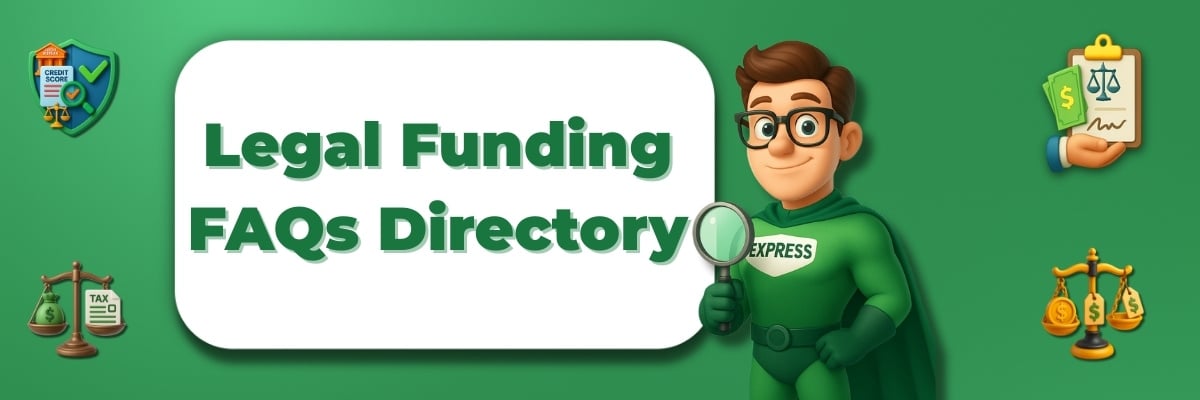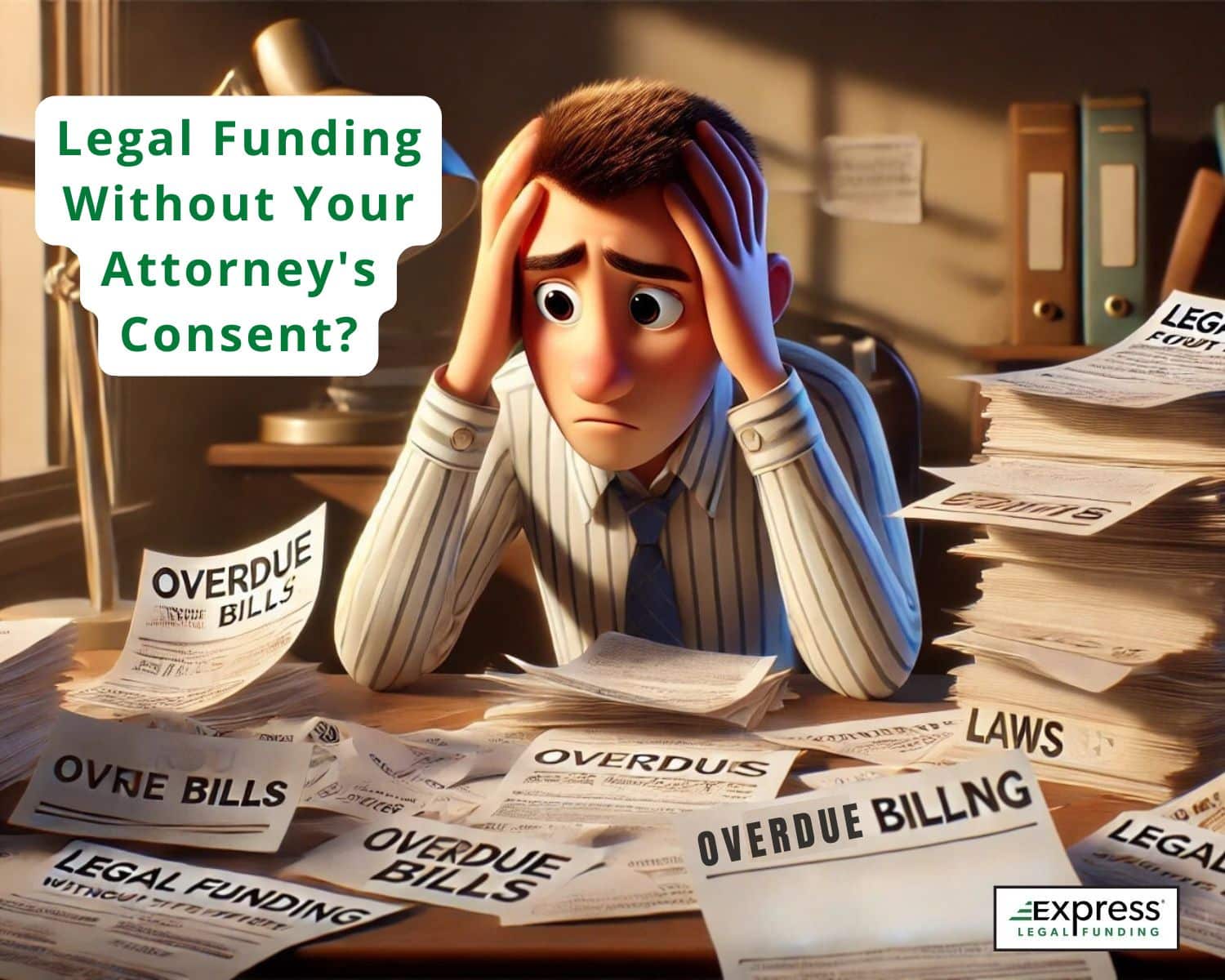
Legal Funding Basics FAQs
Non-recourse legal funding is a risk-free cash advance provided to plaintiffs during ongoing litigation. It requires no collateral and is only repaid if the case results in a settlement or favorable judgment. If the lawsuit is unsuccessful, the plaintiff owes nothing, making it a safe and flexible financial solution for those awaiting compensation.
Overview of Non-Recourse Legal Funding
Non-recourse legal funding, also known as pre-settlement funding and sometimes referred to as a lawsuit loan, is a risk-free cash advance available to injured plaintiffs while they wait for their case to resolve.
This guide explains how it works, how it differs from a traditional loan, what types of cases qualify, and why Express Legal Funding is a trusted provider offering fast, transparent support with no repayment required if you lose your case.
How Non-Recourse Legal Funding Works
What is non-recourse legal funding for plaintiffs?
Non-recourse legal funding is a cash advance offered to plaintiffs in civil lawsuits, based on the anticipated value of their future settlement or judgment. It’s considered “non-recourse” because you only repay the funding if your case is successful, either through a settlement or court award. If you lose, you owe nothing.
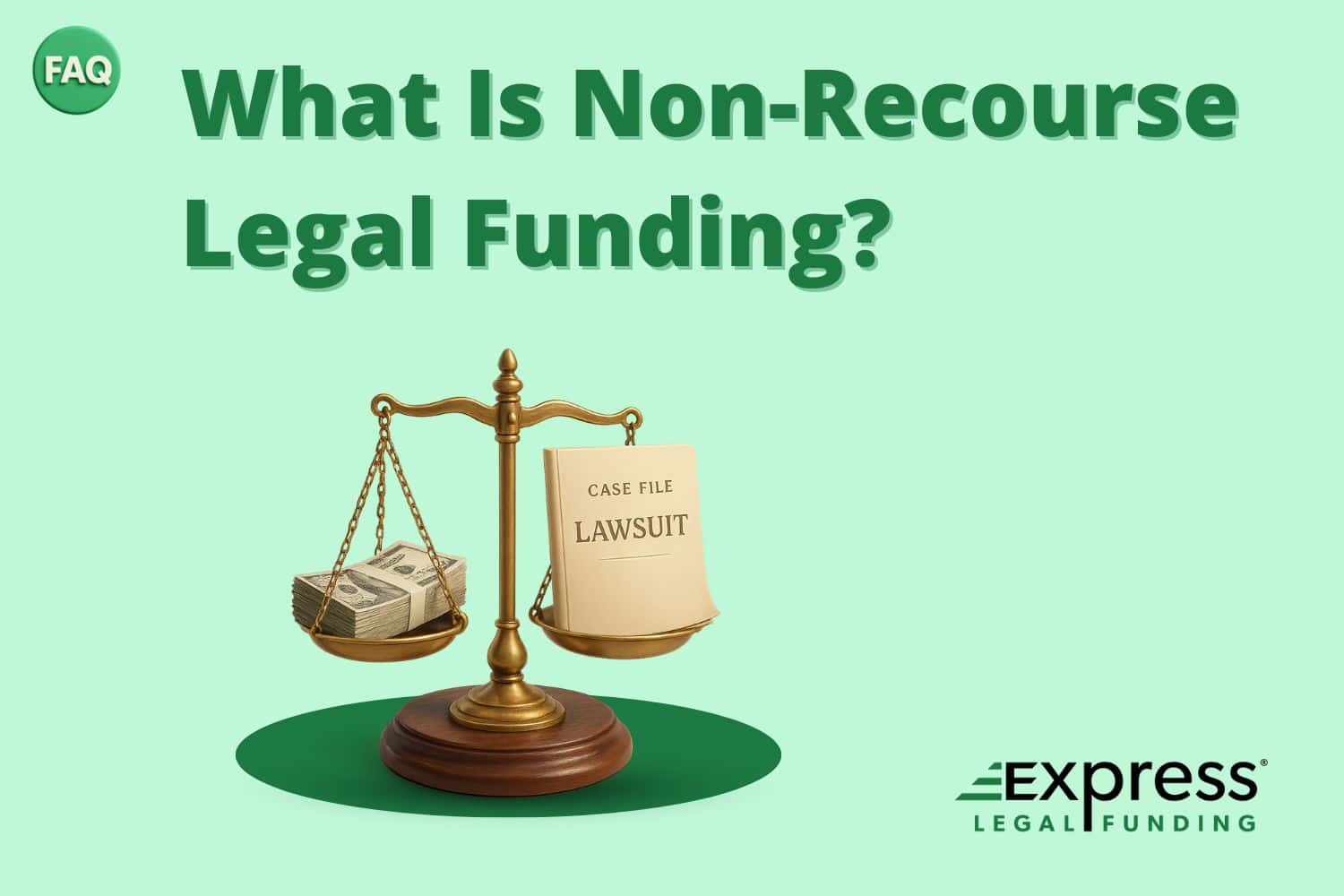
How does non-recourse funding differ from recourse loans?
Non-recourse legal funding is fundamentally different from traditional (recourse) loans because it carries no personal repayment obligation. If you lose your case, you’re not required to repay the advance. In contrast, recourse loans hold you personally liable, meaning the lender can pursue your income, credit, or assets to collect the debt, regardless of the outcome of your case.
Why is it called 'non-recourse'?
The term “non-recourse” means the funding company cannot pursue you personally for repayment if your case is unsuccessful. Their only source of repayment is your future settlement or court award. If there’s no recovery, you owe nothing.
Is non-recourse legal funding considered a loan?
No. Legal funding is typically classified as a non-loan financial product or legal advance. This distinction means it isn’t subject to the same laws and interest rate caps that govern loans.
Key Terms in a Non-Recourse Funding Agreement
What are the legal terms involved in a non-recourse legal funding agreement?
A non-recourse legal funding agreement sets forth the official terms under which a plaintiff receives an advance on their expected settlement. The contract is designed to ensure transparency and legal clarity for all parties involved. Key provisions typically include:
- Funding amount: The specific dollar amount being advanced to you based on your case’s estimated value.
- Repayment terms: Clear instructions on how and when repayment occurs—usually only if and when you receive a monetary settlement or judgment.
- Fees and charges: A detailed breakdown of applicable funding rates, capped fees, and how charges accrue over time (e.g., fixed or compounding).
- No-repayment clause: A critical provision confirming that you owe nothing if your case is unsuccessful—this is what makes the funding non-recourse.
- Purchase Agreement: The core legal contract that outlines the sale of a portion of your future recovery to the funding company in exchange for the advance.
- Consumer Disclosure: A document summarizing the funding terms in plain language, including the total anticipated repayment amount and effective rate, designed to ensure you understand the cost of funding.
- Payment Instructions: Specifies how you wish to receive your funds (e.g., via ACH transfer, wire, e-check, or other method).
- Notice of Purchase and Assignment: A clause stating that the funding company has purchased a portion of your potential recovery, and that this assignment is acknowledged by you and your attorney.
- Irrevocable Letter of Direction: An authorization directing your attorney to repay the funding company directly from your settlement or judgment proceeds before disbursing any remaining funds to you.
- Attorney Acknowledgment: A signed statement from your attorney confirming their cooperation, agreement with the terms, and responsibility for handling repayment per the contract.
These components work together to ensure legal clarity, consumer protection, and ethical handling of funds throughout your case.
Learn more about the different types of legal funding in our guide: What Are the Types of Legal Funding?
Do I have to repay my non-recourse legal funding if I lose my case?
No. That’s the key benefit of non-recourse funding. You are not obligated to repay the advance if you do not win or settle the case.
Who Qualifies and How to Apply for Non-Recourse Legal Funding
Who qualifies for non-recourse legal funding?
To qualify for non-recourse legal funding, you must have a strong personal injury or civil lawsuit, be represented by a contingency fee attorney, and have a lawyer who is willing to cooperate with the funding company by providing case documents for review.
What types of cases are eligible for non-recourse legal funding?
Common case types that qualify for non-recourse legal funding include:
- Car accidents
- Slip and fall injuries
- Medical malpractice cases
- Wrongful death
- Workplace injuries
- Product liability lawsuits
Do I need an attorney to apply for legal funding?
You can apply for legal funding without an attorney, but you must have legal representation to be approved. Funding companies require your attorney’s cooperation to review your case and finalize the funding agreement.
Explore the importance of having a lawyer for pre-settlement funding further in our guide: Can I Get Pre-Settlement Funding Without Attorney Consent?
Can I be denied funding? If so, why?
Yes, legal funding can be denied for several reasons. Common factors include weak or disputed liability, a low expected settlement value, an attorney who is unwilling to cooperate, or excessive existing funding from other providers that limits remaining recovery.
Non-Recourse Funding Process and Repayment
How does the non-recourse legal funding process work?
The non-recourse legal funding process is fast and straightforward:
- Submit your application: Apply online or over the phone with basic case details.
- Attorney cooperation: Your lawyer provides case documents and confirms representation.
- Case evaluation: The funding company reviews your claim’s strength and estimated value.
- Approval and agreement: If approved, you’ll receive a funding agreement to sign.
- Receive your funds: Once finalized, funds are typically disbursed within 24 hours, often the same day.
How much money can I receive through legal funding?
The amount you can receive through legal funding depends on the estimated value of your case. Advances typically range from $500 to $500,000. Funding companies assess your projected settlement by evaluating damages, including medical expenses, lost wages, and pain and suffering, along with attorney fees, liens, and other case-related deductions.
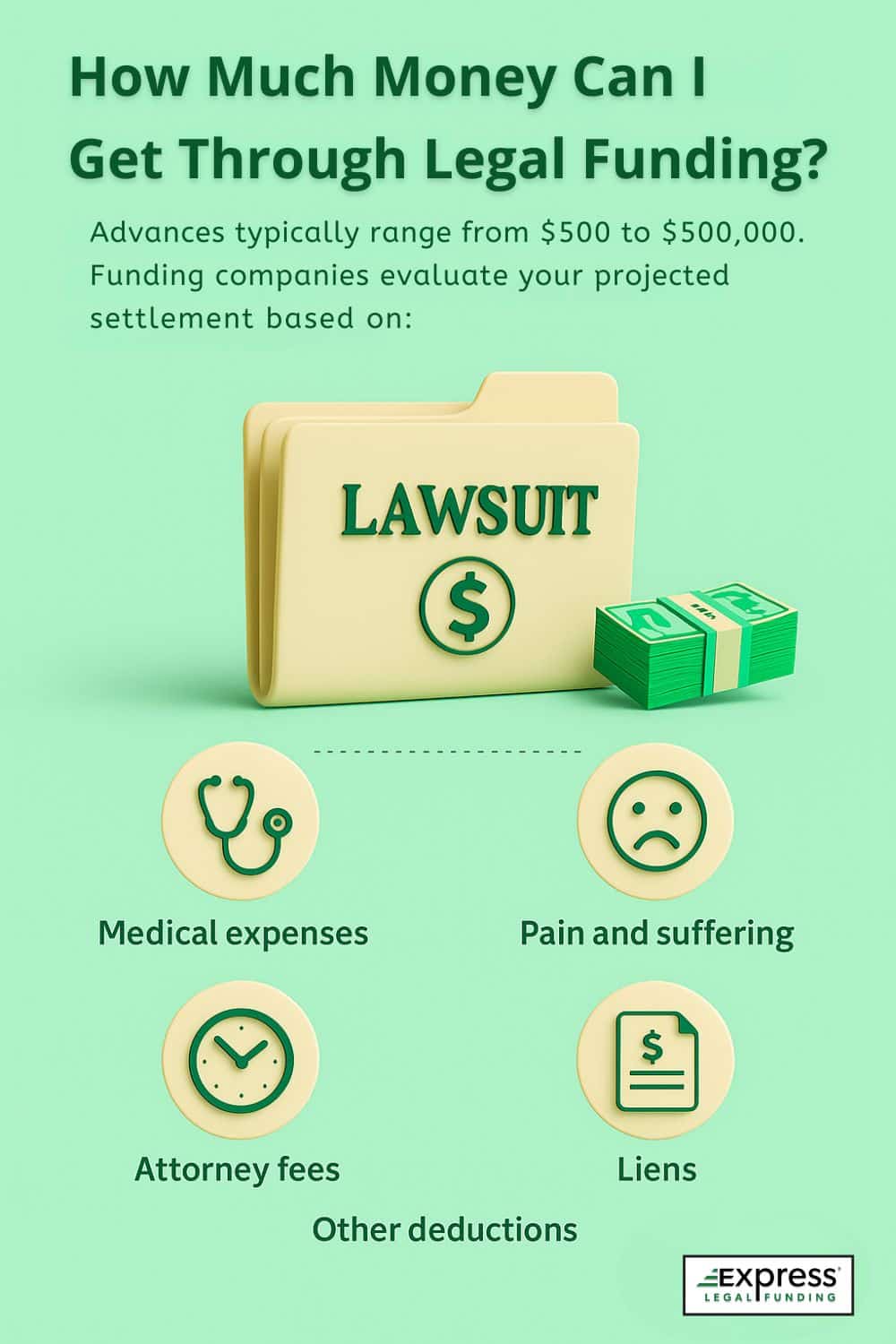
Relevant guide: How Much Pre-Settlement Funding Can I Get on My Case?
When do I get my funds after approval?
Most clients receive their funds within 24 hours of approval—often the same day—through a secure ACH transfer, direct deposit, or e-check, depending on the method selected.
What happens if my case takes longer than expected?
If your case takes longer than expected, there’s no pressure to repay early—non-recourse legal funding is only repaid after your case settles. Your agreement remains valid for the duration of your lawsuit, though fees or charges may continue to accrue over time based on the terms outlined in your contract.
Are there any upfront costs or fees?
No, reputable legal funding companies do not charge any upfront costs. There are no application fees, hidden charges, or credit checks required. Any fees associated with the funding are only repaid after your case settles or results in a successful judgment.
How are fees calculated on non-recourse legal funding?
Fees on non-recourse legal funding are usually calculated as either a fixed rate or a monthly compounding rate applied to the funded amount. The total cost depends on how long your case takes to resolve, so it's important to ask whether the fees are based on a simple interest model or compound over time.
Try our pre-settlement loan calculator
Do interest rates apply to my funding amount?
Yes, though they’re often not classified as traditional “interest” under state laws. Instead, these charges are typically labeled as funding fees or usage fees, which can vary significantly between providers. Rates vary widely, so review the terms carefully and choose a company that offers clear, transparent pricing.
Non-Recourse Legal Funding Benefits and Drawbacks
What are the benefits of choosing non-recourse funding?
Non-recourse legal funding provides several important advantages for plaintiffs during a pending lawsuit:
- No repayment if you lose: You owe nothing if your case doesn’t result in a settlement or award.
- Fast access to cash: Funds are often disbursed within 24 hours of approval.
- Covers essential living expenses: Helps you pay for rent, groceries, medical bills, and utilities.
- No credit impact: No credit checks are required, so it shouldn’t affect your credit score.
- Supports a stronger case outcome: Gives your attorney more time to negotiate a fair and full settlement without financial pressure.
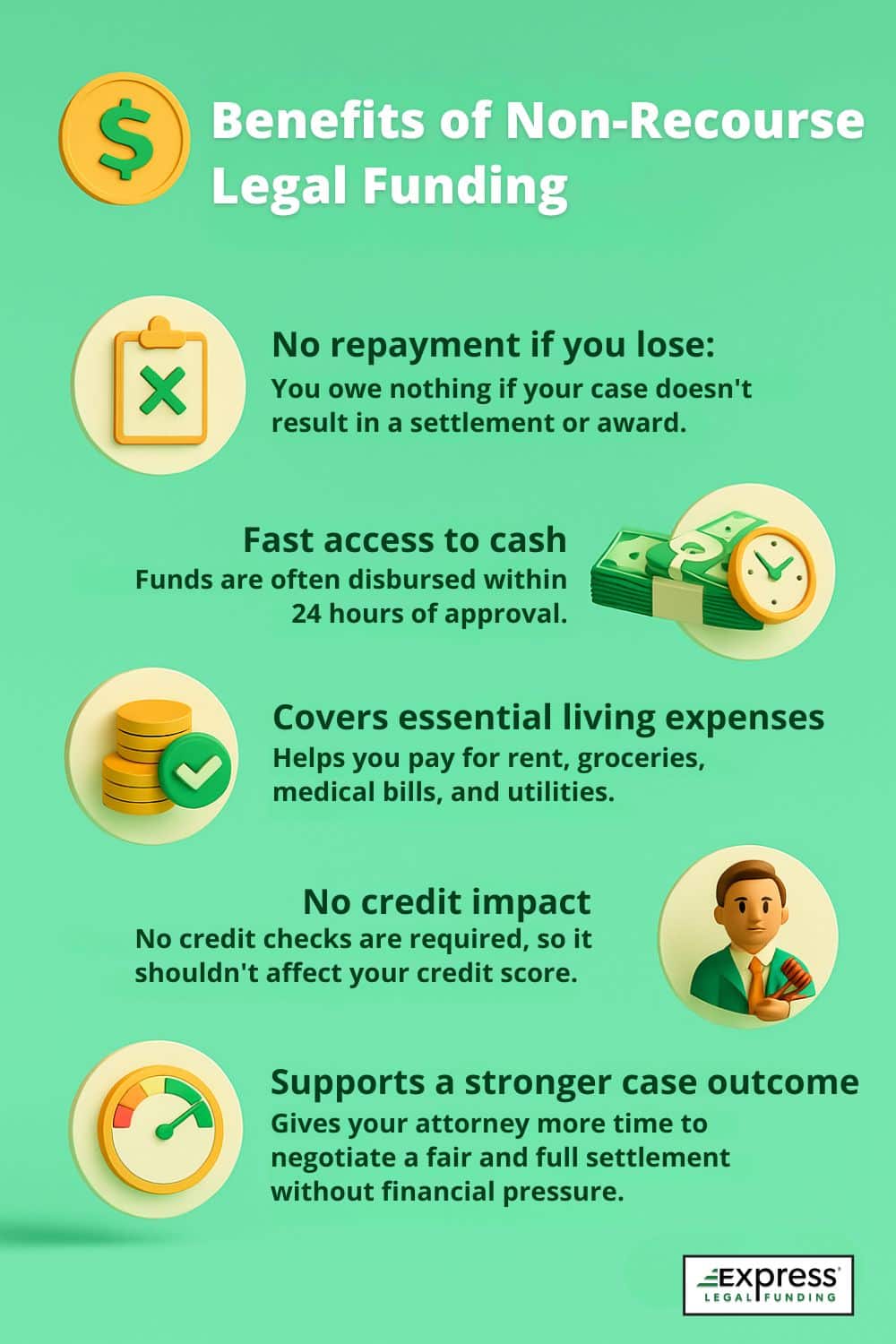
Are there risks involved for plaintiffs?
Non-recourse legal funding isn’t considered risky because you owe nothing if you lose your case. However, the advance and any applicable fees are deducted from your final settlement, which can reduce your net payout. Since you’re receiving part of your future settlement upfront, it’s important to borrow only what you need and fully understand the terms.
How does non-recourse funding help during long legal battles?
Non-recourse funding provides crucial financial support during prolonged lawsuits, helping plaintiffs pay for essentials like rent, food, and medical bills. By easing financial stress for plaintiffs, it prevents the need to settle early for less and gives your attorney the time and leverage to pursue the full value of your claim.
Legal Rights and Protections
Is non-recourse funding regulated by law?
Regulation of non-recourse legal funding varies by state. Some states have specific laws or consumer protection regulations that govern the industry, while others do not regulate it at all. Because oversight differs, it’s essential to read your contract thoroughly and ask questions to ensure you understand the terms.
Can a legal funding company interfere in my case?
No, legal funding companies are not allowed to interfere with your case. They have no control over legal decisions, settlement negotiations, or your attorney’s strategy—those remain strictly between you and your lawyer.
What rights do I have under a non-recourse funding agreement?
When you enter into a non-recourse funding agreement, you’re entitled to several important rights designed to protect your interests:
- Right to clear disclosure of terms: You have the right to receive a transparent explanation of all fees, rates, and repayment conditions before signing.
- Right to cancel within a grace period: In many states, you can cancel the agreement without penalty within a specified time frame.
- Right to attorney-client confidentiality: Your legal funding arrangement does not waive your attorney-client privilege and, in some states, is specifically protected from discovery.
What should I look for in a legal funding company?
When choosing a legal funding provider, look for a company that prioritizes fairness, speed, and transparency. Key qualities include:
- Transparent terms: Clear, easy-to-understand contracts with no confusing language.
- Capped fees: Limits on how much the legal funding costs can grow over time.
- No hidden charges: All fees should be disclosed upfront—no surprises later.
- Fast turnaround: Quick application processing and same-day or next-day funding options.
- Excellent customer support: Responsive, knowledgeable staff to guide you through the process.
- Direct funding (not via brokers): Work with companies that fund cases directly to avoid extra markups or third-party delays.
Alternatives to Non-Recourse Legal Funding
If you're not ready to pursue legal funding or want to explore other financial options, here are some common alternatives to help cover expenses during a lawsuit:
- Personal savings: Using your own funds can help you avoid fees or repayment obligations.
- Friends or family: Borrowing from trusted individuals may provide flexible, interest-free support.
- Personal loans or credit cards: These options may be accessible but often involve interest, credit checks, and personal liability.
- Disability benefits or insurance payouts: If you're eligible, these can provide steady income during recovery.
- Crowdfunding platforms: Online fundraising through platforms like GoFundMe can help gather community support for urgent needs.
Relevant guide: 15 Alternatives to Lawsuit Loans
Is non-recourse legal funding the right choice for me?
If you're struggling financially while waiting for your personal injury or civil case to settle, non-recourse legal funding can be a smart solution. It provides fast, risk-free support with no repayment if you lose—making it a helpful tool when used responsibly and with a clear understanding of the terms.
How is Express Legal Funding different from other legal funding companies?
Express Legal Funding sets itself apart by providing honest, affordable, and risk-free non-recourse legal funding designed to protect your recovery. Here's what makes us different:
- Low, affordable rates: Our pricing is competitive and structured to help you keep more of your settlement.
- Capped origination fee: We limit the upfront cost to ensure your funding remains fair and manageable.
- Capped funding rate: Your rate won’t spiral over time—we set clear maximums to protect your payout.
- Direct funding—not through brokers: We fund your case directly, eliminating broker markups and delays.
- 100% risk-free guarantee: You owe nothing if your case doesn’t settle or win—no hidden conditions.
- No hidden fees: All terms are clearly disclosed upfront, with no surprise charges.
At Express Legal Funding, we prioritize transparency and fairness, so you get the financial support you need without compromising your future settlement.
See why Express Legal Funding ranked number one as the best legal funding company in 2025: 10 Best Legal Funding Companies in 2025
Final Thoughts on Non-Recourse Legal Funding
Non-recourse legal funding can be a valuable lifeline for plaintiffs facing financial hardship during a pending lawsuit. It offers risk-free access to cash when you need it most, without adding debt or requiring repayment if your case is unsuccessful.
As with any financial decision, it’s important to understand the terms, borrow only what you need, and choose a transparent, reputable funding company. When used wisely, non-recourse funding can help you stay afloat and give your attorney the time needed to pursue the fair settlement you deserve.
Apply Now for Non-Recourse Legal Funding
Are you waiting on a personal injury or civil lawsuit to settle and need fast financial support? Express Legal Funding can help you get the cash you need, risk-free and with no upfront costs.
Apply in Minutes
Simply complete the secure form below. Our team will review your application and contact your attorney for a quick case evaluation.
Yes, you need an attorney to qualify for legal funding. Pre-settlement funding companies, including Express Legal Funding, require that you have legal representation from a contingency-fee attorney. Without a lawyer, your application can’t be approved, as attorneys play a crucial role in verifying your case, ensuring legal compliance, and protecting your interests.
Before you can get approved for pre-settlement funding, one of the most important requirements is having a lawyer on your side. Legal funding companies won’t move forward with your application unless you're represented by an attorney who can verify your case details and ensure everything is handled ethically.
Here’s why having legal representation is essential for getting legal funding.
Why You Need a Lawyer to Get Legal Funding
Legal funding, also called pre-settlement funding or a lawsuit cash advance, is not a loan. It's a non-recourse financial agreement: you only repay if you win or settle your case.
Because of this structure, legal funding companies must evaluate your case’s strength, and that’s only possible with help from your attorney of record.
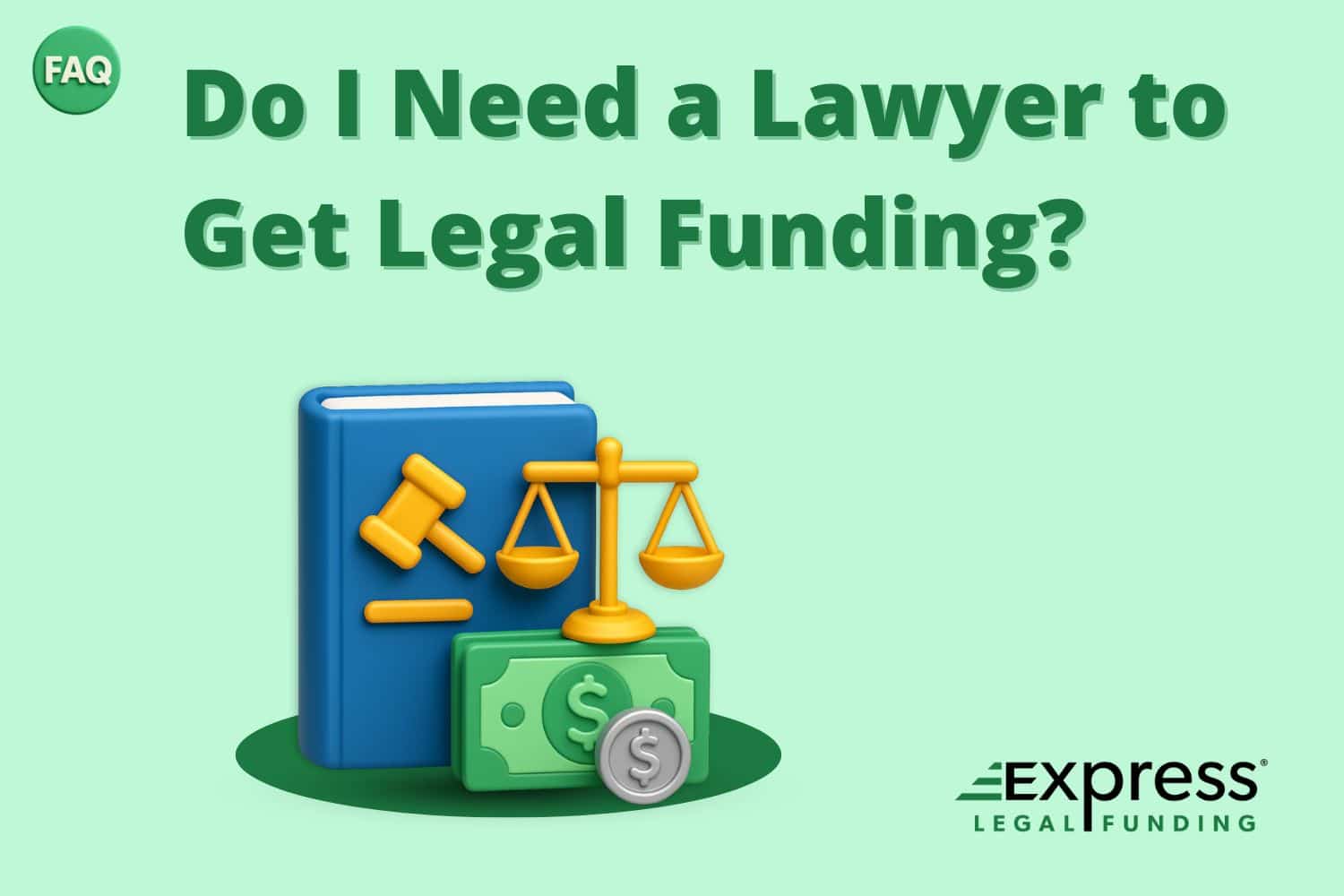
Legal Funding Requires a Contingency-Fee Attorney
To be eligible for legal funding:
- Your lawyer must work on a contingency fee basis (no win, no fee).
- The attorney must be actively involved in your lawsuit.
- They must agree to cooperate with the funding provider and verify case documentation.
This legal relationship ensures the funding company can accurately assess the risk and your likelihood of winning the case.
Legal Funding Is Not a Traditional Loan
Legal funding is non-recourse, meaning repayment is only required if your case is successful. This differs from traditional loans and aligns with the contingency fee structure, where attorneys are paid based on the outcome of your case. This is why legal funding is often called a pre-settlement cash advance.
What Your Attorney Does During the Legal Funding Process
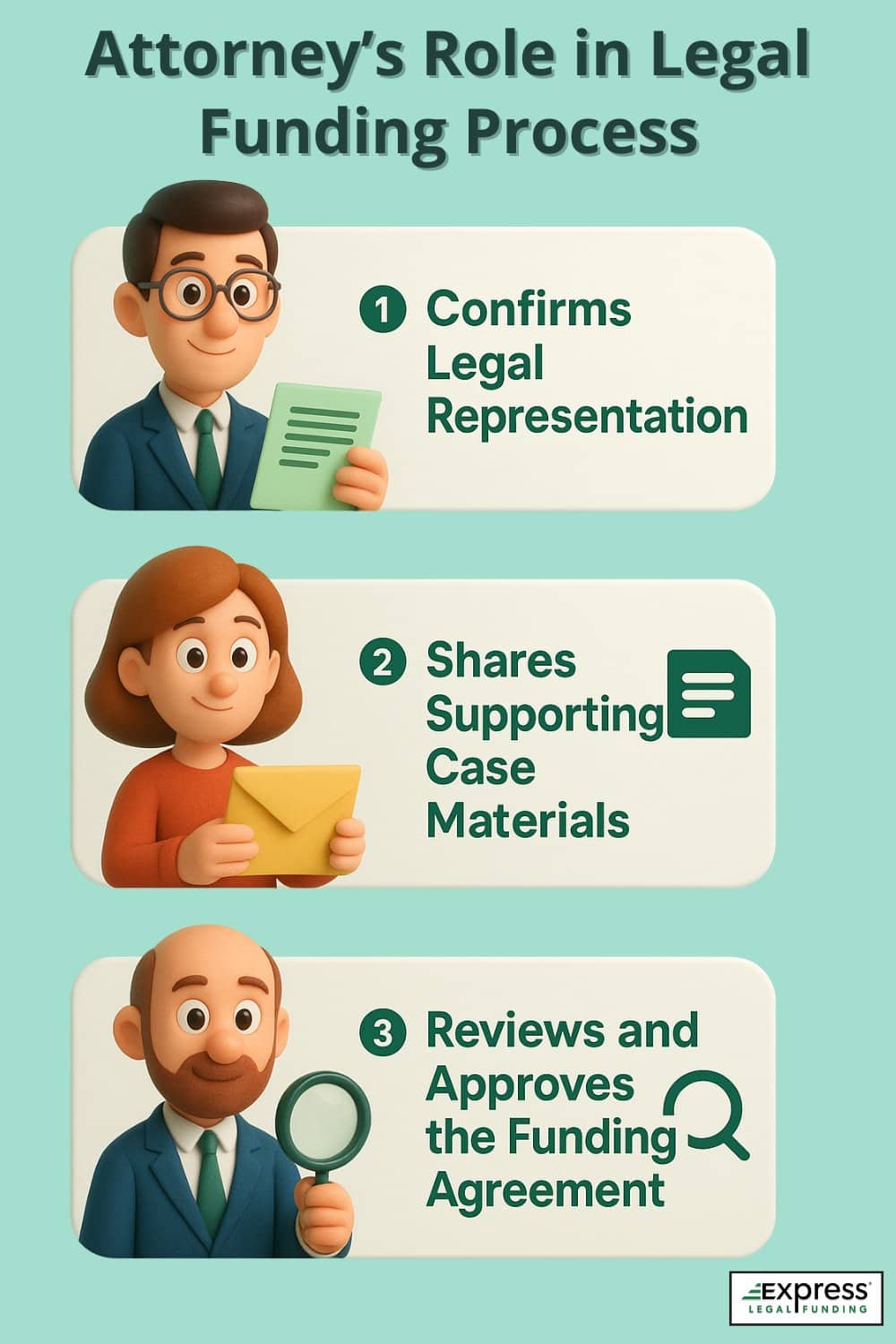
Your lawyer is essential at every step of securing legal funding:
1. Confirms Legal Representation
Verifies that you’re actively pursuing a valid claim with their help.
2. Shares Supporting Case Materials
Attorneys play a vital role in submitting necessary documents and communicating with legal funders. This includes sending police reports, medical records, demand letters, and other documents needed to assess your case.
3. Reviews and Approves the Funding Agreement
Your attorney evaluates the funding terms to ensure they’re fair, ethical, and in your best interest.
Can I Get Legal Funding Without a Lawyer?
No. Reputable legal funding companies do not work with unrepresented plaintiffs (also known as pro se litigants). Here’s why:
- Legal Barriers: Many states require attorney involvement for consumer legal funding.
- Risk of Misunderstanding: Without legal guidance, clients may not understand the terms or risks of getting legal funding.
- Underwriting Limitations: Funders can’t properly evaluate a case without legal insight.
Applying without an attorney poses risks, such as misunderstanding terms and lacking proper case evaluation.
Exception: Some limited non-litigation claims, such as certain probate or inheritance funding, may not require an attorney, but these are rare.
What If My Attorney Doesn’t Approve of Legal Funding?
Ultimately, attorney participation is voluntary. If your lawyer refuses to cooperate, you will not be able to receive funding from Express Legal Funding or any reputable provider, but it’s important to understand why they’re concerned and what your options are. Legal funding companies rely on attorney cooperation to move forward, so their disapproval can delay or prevent approval.
Relevant guide: Can My Lawyer Stop Me From Getting Pre-settlement Funding?
Common Reasons an Attorney May Say No to Legal Funding or Lawsuit Loans
Your lawyer might reject a funding request due to:
- Ethical concerns: They may worry about high interest rates or repayment terms that could harm your financial recovery.
- Firm policies: Some law firms avoid third-party funding arrangements altogether to avoid conflicts of interest or administrative burdens.
- Impact on settlement strategy: Attorneys may believe funding could discourage you from accepting a fair settlement offer or complicate lien negotiations.
What You Can Do Next

If your attorney declines to cooperate with a legal funding request, here are steps you can take:
- Start a conversation: Ask your attorney to explain their specific concerns and whether they’d support funding with revised terms.
- Negotiate better terms: Reach out to the funding company to see if they’ll adjust the offer to satisfy your attorney’s standards.
- Explore alternatives: Consider other forms of financial help, such as personal loans, hardship grants, or connecting with a different law firm if appropriate.
Pro Tip: Legal funding is most successful when your attorney is fully on board. If you're working with Express Legal Funding, we’re happy to collaborate directly with your lawyer to answer their questions, address concerns, and provide transparent terms that meet ethical standards.
How to Apply for Legal Funding With an Attorney
- Hire a Contingency-Fee Attorney: Choose a lawyer who agrees to work on your case and supports legal funding.
- Apply with Express Legal Funding: Complete the online application form or call our team directly.
- Attorney Case Review: We contact your attorney to request case documentation and confirmation of representation.
- Approval and Agreement: If approved, both you and your attorney will receive and sign your portions of the funding contract.
- Receive Funds: Get your lawsuit cash advance, often within 24 hours of approval.
Can I Apply for Legal Funding Before Hiring a Lawyer?
Yes, you can begin the legal funding inquiry process before hiring a lawyer, but you won’t be approved until you retain legal counsel. Most legal funding companies, including Express Legal Funding, require your attorney’s active involvement to evaluate your case and move forward with approval.
[ninja_tables id="21910"]FAQs About Needing a Lawyer to Get Legal Funding
Do pre-settlement funding companies require my lawyer to sign anything?
Yes. Reputable pre-settlement funding companies typically require your attorney to sign a confirmation of representation and lien agreement known as an "Attorney Acknowledgment". This signed document verifies that your lawyer is actively handling your case and agrees to cooperate by sharing case information and ensuring repayment from the future settlement proceeds.
Without this signed cooperation, your funding application cannot be approved.
Relevant guide: Can I Get Pre-Settlement Funding Without Attorney Consent?
Can I switch attorneys to one who supports legal funding?
Yes, but it's a decision that should be made cautiously. While switching to an attorney who supports legal funding is possible, it's generally best to maintain continuity with your current lawyer whenever possible. Changing representation can delay your case and may not always be in your best interest.
We recommend first discussing your concerns openly with your attorney to explore potential solutions before considering a switch.
What if I already applied and didn’t have a lawyer?
Your application cannot be approved without legal representation. Legal funding companies require an attorney to verify your case details and participate in the approval process. If you applied without a lawyer, you’ll need to hire one before your application can proceed.
Once you have legal representation, you can reapply. If you need help finding an attorney, many legal funding companies, like Express Legal Funding, can offer referrals to qualified lawyers in your area.
Have More Questions About Legal Funding and Attorney Involvement?
If you're wondering whether your case qualifies for funding or need help finding an attorney:
- 📞 Call Express Legal Funding Toll-Free at (888) 232-9223
- 📝 Apply Online for Legal Funding
No, pre-settlement funding does not require monthly payments. Unlike traditional loans, repayment is only made from the settlement proceeds once your case is resolved. This means you can access funds without the stress of monthly bills, allowing you to focus on your legal proceedings without financial pressure.
Pre-settlement funding is a financial service designed to provide plaintiffs with cash advances against their expected settlement.
Unlike traditional loans, pre-settlement funding is non-recourse, meaning there are no monthly payments, no credit checks, and no personal liability if the case is lost.
This page answers common questions about repayment and monthly obligations associated with pre-settlement funding.
Do I Have to Make Monthly Payments on a Pre-Settlement Funding Advance?
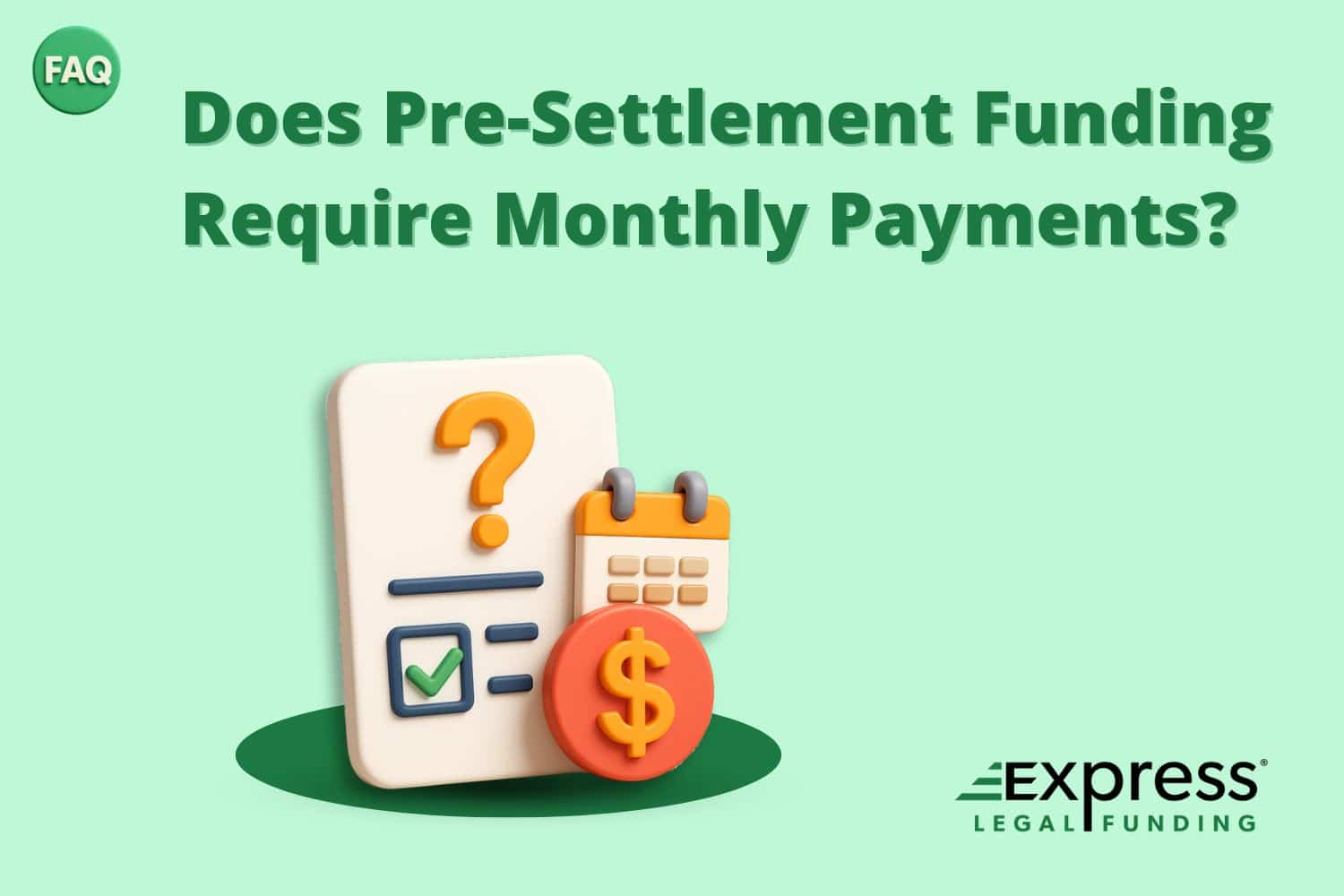
No, you do not have to make monthly payments on a pre-settlement funding advance.
Pre-settlement funding is non-recourse, meaning repayment is only required if the plaintiff wins or settles their case. The funds are repaid directly from the settlement, not out of pocket. This ensures no monthly bills and no financial pressure during your lawsuit.
FAQs About Monthly Payments and Pre-Settlement Funding
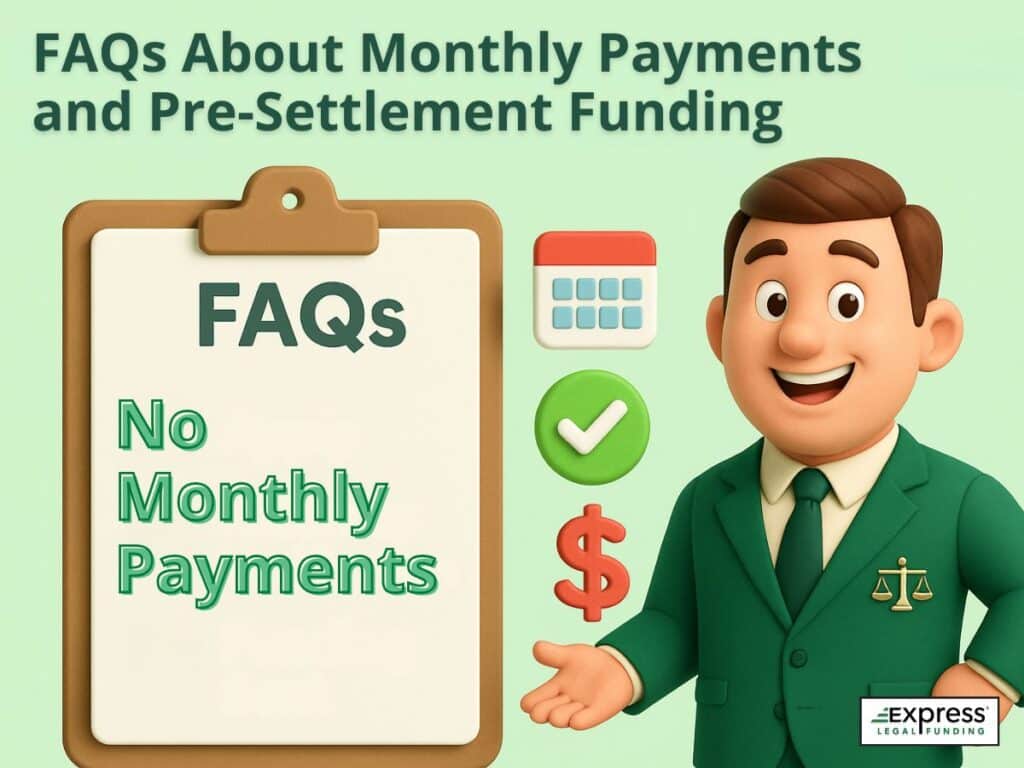
What Happens If My Case Is Unsuccessful?
Pre-settlement funding is non-recourse, which means you are not required to repay the settlement advance if your case is lost. There is no personal liability and no risk of owing money if you do not receive compensation. This makes legal funding a safer financial option during a lawsuit.
Is Pre-Settlement Funding a Loan?
No, pre-settlement funding is not a traditional loan. It is a non-recourse cash advance based on the potential value of your lawsuit. Unlike personal or payday loans, it is not classified as debt, and you are not required to make monthly payments or repay the funds out of pocket.
Instead, repayment is contingent on a successful outcome, meaning you only repay the advance if your case settles or you win. The repayment comes directly from your settlement proceeds. If you lose, you owe nothing.
This unique structure provides financial relief without the burden of traditional loan obligations, making it a risk-free option frequently used by personal injury plaintiffs who need help covering living expenses, medical costs, and lost wages while their cases are still pending.
Read our step-by-step guide on getting a pre-settlement advance while your lawsuit is pending: Can I Get a Loan on a Pending Lawsuit?
Is a Credit Check Required for Pre-Settlement Funding?
No, credit checks are typically not required for pre-settlement funding. Approval is based on the strength of your case—not your credit history—making this type of legal funding accessible to plaintiffs with poor credit. This provides critical financial relief during a lawsuit, even for those facing financial hardship.
How Is My Pre-Settlement Funding Amount Calculated?
The amount of pre-settlement funding you can receive depends on the expected value of your case and the risk involved. Key factors include the strength of your legal claim, the severity of your injuries, available insurance coverage, and how likely you are to win or settle successfully.
How Long Does Pre-Settlement Funding Take to Arrive?
Pre-settlement funding is typically available within 24 to 48 hours after your application is approved.
Here’s a typical timeline:
- Apply: Submit a short application online or over the phone.
- Attorney Verification: The funding company contacts your lawyer to confirm case details.
- Case Review: Underwriters evaluate your case’s strength and estimated value.
- Funding Sent: Once approved, funds are usually sent via direct deposit or e-check the same day.
What Can I Use Pre-Settlement Funds For?
Pre-settlement funds offer flexibility and can be used for various urgent personal expenses, including:
- Medical Bills: Covering treatment costs and healthcare needs.
- Living Expenses: Paying for rent, mortgage, utilities, and groceries.
- Transportation: Managing travel costs related to your case or daily needs.
- Childcare: Ensuring care for children while you focus on your legal proceedings.
This flexibility allows you to address immediate financial needs without restrictions, providing peace of mind during the legal process.
What Are the Fees Associated with Pre-Settlement Funding?
The fees and rates for pre-settlement funding vary depending on the provider.
Some companies charge a flat fee, while others use compound interest that increases over time. Because of these differences, it's essential to review your contract carefully.
A reputable legal funding company will clearly disclose all costs upfront. There should be no hidden fees. Make sure you fully understand how the fees work and how much you may owe if your case takes months or even years to settle. Transparency and clarity in the terms help protect your settlement and avoid surprises later.
Will My Attorney or the Defendant Know About My Funding?
Your attorney will be involved in the legal funding process, but the defendant is typically not made aware of your pre-settlement funding.
The funding company will contact your attorney to verify key case details and assist with the approval process. While attorney consent and participation are required, your funding agreement is generally kept confidential and does not need to be shared with the opposing party.
Disclosure is only necessary in rare cases if ordered by the court, meaning your legal strategy and settlement negotiations are usually unaffected.
For a deeper look at attorney involvement in legal funding, read: Do I Need a Lawyer to Get Legal Funding?
Key Takeaways About Monthly Payments and Legal Funding
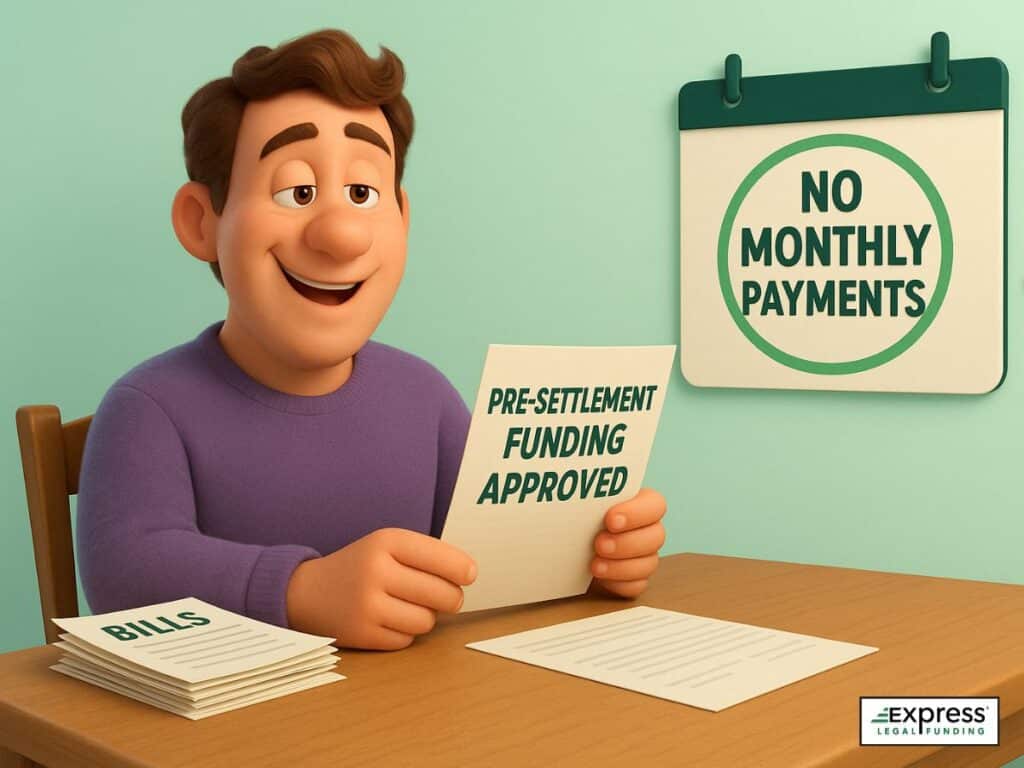
- No monthly payments
- Repay only if you win
- No credit check required
- Use funds however you need
- Fast access to cash
Ready to Apply for Pre-Settlement Funding?
Express Legal Funding offers fast, risk-free financial support with no monthly payments required. Get the cash you need now, so you can focus on your recovery while your lawyer fights for a fair settlement.
Apply Today:
- Phone: (888) 232-9223
- Apply Now – Complete our quick and easy application form to get started.
Most clients receive funding in as little as 24 hours after approval. There are no upfront fees, no credit checks, and no repayment unless you win.
Legal funding is a non-recourse cash advance that allows plaintiffs with pending legal claims to access part of their expected settlement or court award before the case is resolved. Repayment is only required if the plaintiff wins or settles, making it a risk-free financial solution during litigation.
Legal funding is a non-recourse cash advance that allows plaintiffs involved in lawsuits to access part of their expected settlement before the case resolves, with no repayment obligations if the case is lost.
Unlike traditional loans, legal funding places a monetary lien on the case itself rather than on the plaintiff, making it a beneficial option for individuals with bad credit.
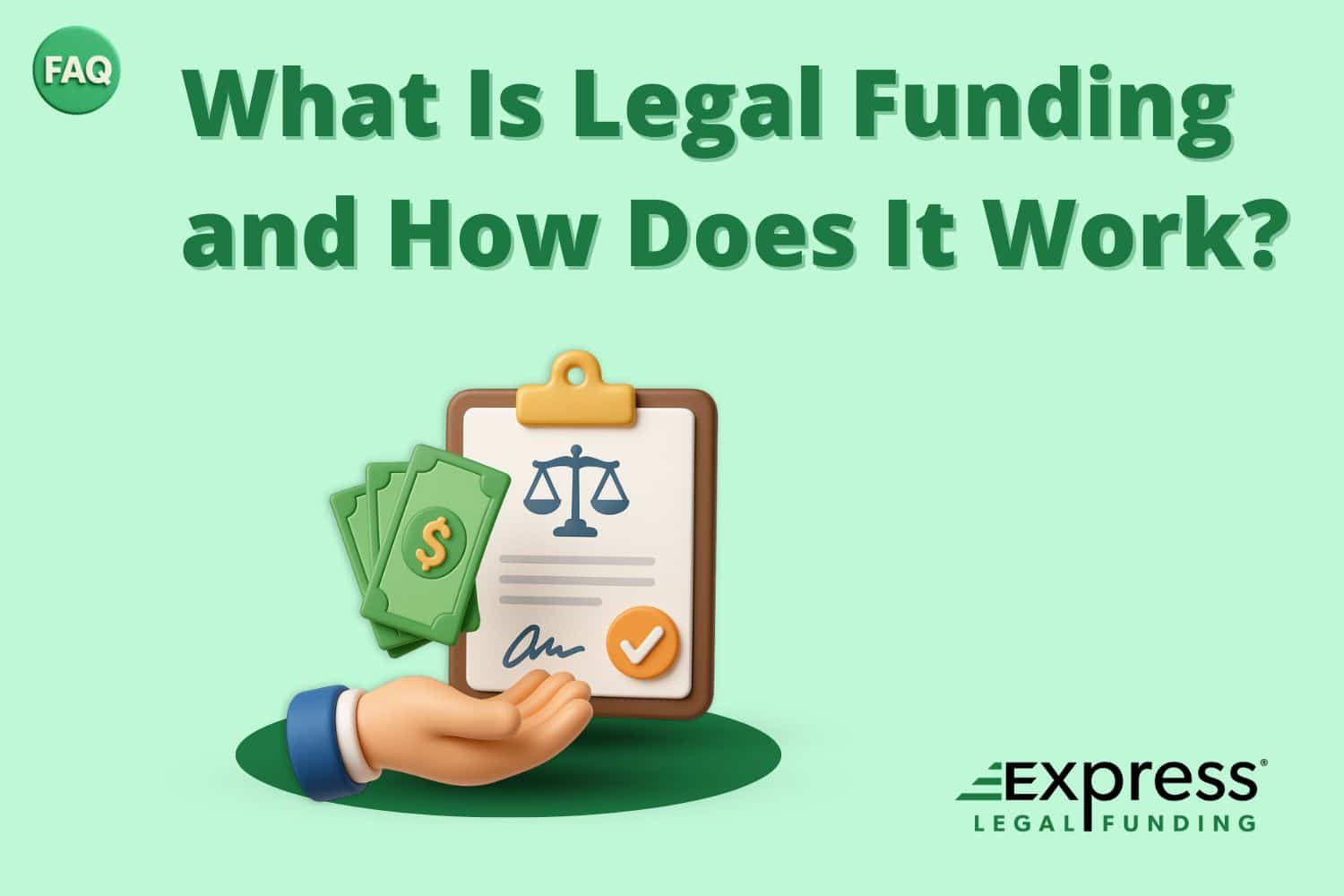
Express Legal Funding is a trusted provider of pre-settlement funding, ensuring plaintiffs don’t repay unless they win. In this guide, we explain how legal funding works, who qualifies, and what to expect, empowering you to make informed financial decisions during litigation.
What Is Legal Funding and Who Is It For?
Legal funding (also known as pre-settlement funding, lawsuit loans, or legal cash advances) is a type of financial support provided to plaintiffs during an active lawsuit. It gives injured or wronged individuals immediate cash to cover essential expenses—like rent, groceries, or medical bills—while they wait for a fair settlement.
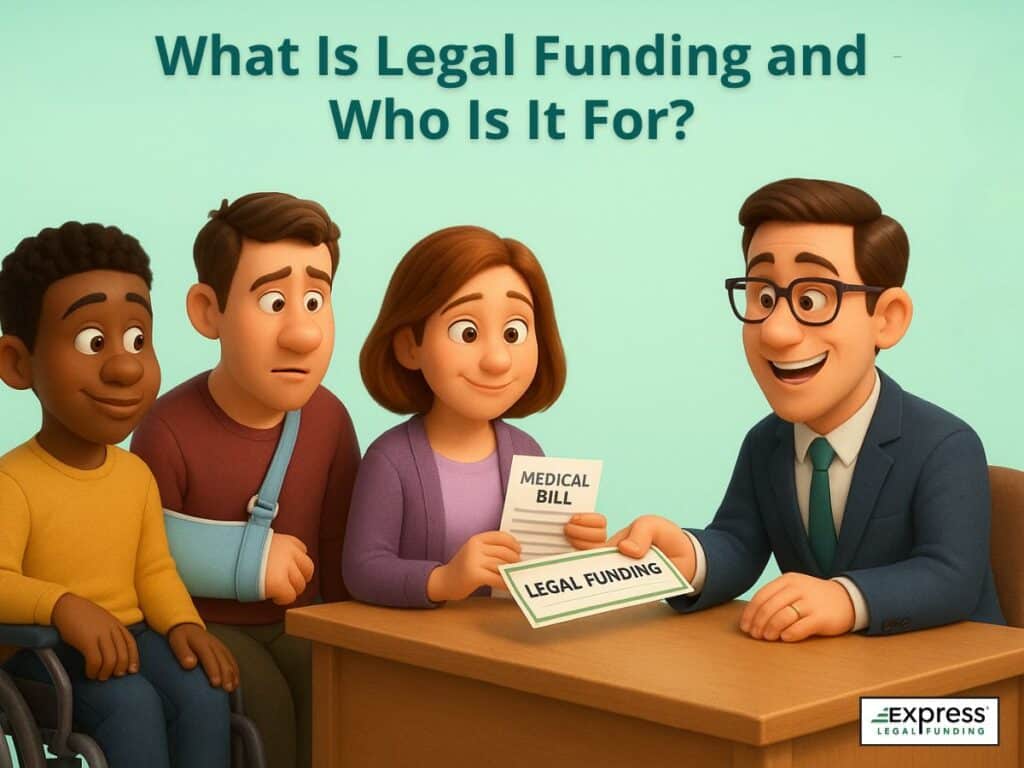
Non-loan Legal Financing
Unlike traditional loans, pre-settlement funding is:
- Non-recourse: You only repay if you win.
- Based on case strength: Not your credit score or employment history.
- Risk-free: If you lose, you owe nothing.
Other Common Names for Legal Funding
- Pre-settlement funding
- Lawsuit loans (often used inaccurately)
- Settlement cash advance
- Lawsuit advance
- Plaintiff funding
How Does Legal Funding Work Step-by-Step?
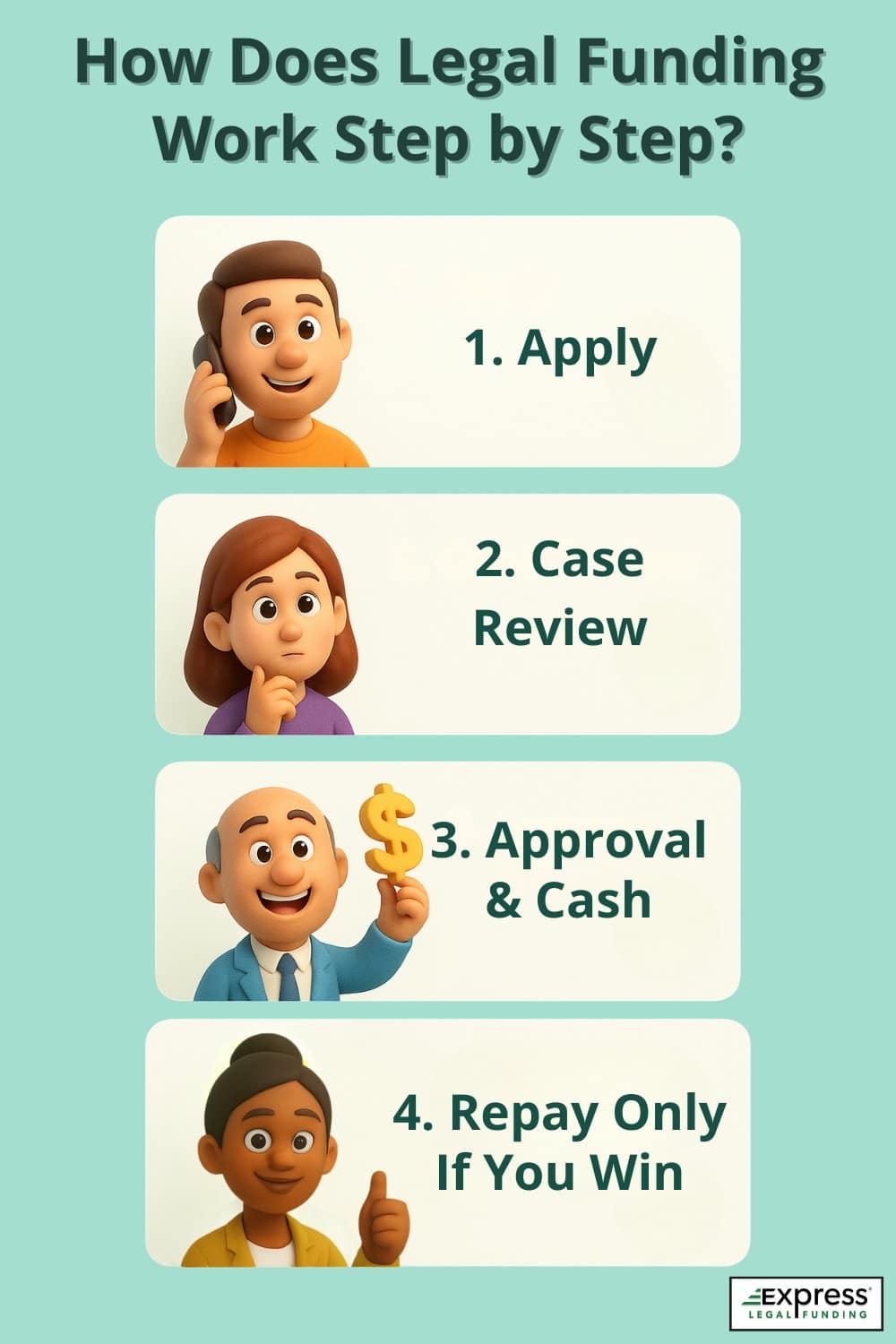
Legal funding is designed to be fast, risk-free, and easy for plaintiffs who need immediate financial relief while pursuing a lawsuit. Here’s how the process works:
Step 1: Apply Online or by Phone
Submit a simple application with basic details about your case, your injuries or claims, and your attorney’s contact information. There’s no credit check, employment verification, or upfront cost to apply.
Step 2: Case Evaluation by Legal Funding Company
Express Legal Funding reviews your case by speaking directly with your attorney. We assess the strength of your claim, liability, and potential settlement value to determine funding eligibility. This review is based entirely on the merits of your lawsuit, not your financial background.
Step 3: Fast Approval and Cash Advance Disbursement
If approved, you’ll receive a pre-settlement advance agreement to review and sign. Once completed, you can receive your cash advance within 24 to 48 hours—often the same day. Funding amounts typically range from $500 to $500,000, depending on your case.
Step 4: Repayment Only If You Win or Settle
There are no monthly payments on legal funding. Repayment is made directly from your future settlement or court award. If you lose your case, you owe nothing—because lawsuit advances are non-recourse, meaning there is no personal liability or obligation to repay.
🟢 Ready to apply for fast, affordable pre-settlement funding from a trusted industry leader?
Apply now with Express Legal Funding and get the cash you need—risk-free.
What Is a Non-Recourse Purchase Agreement?
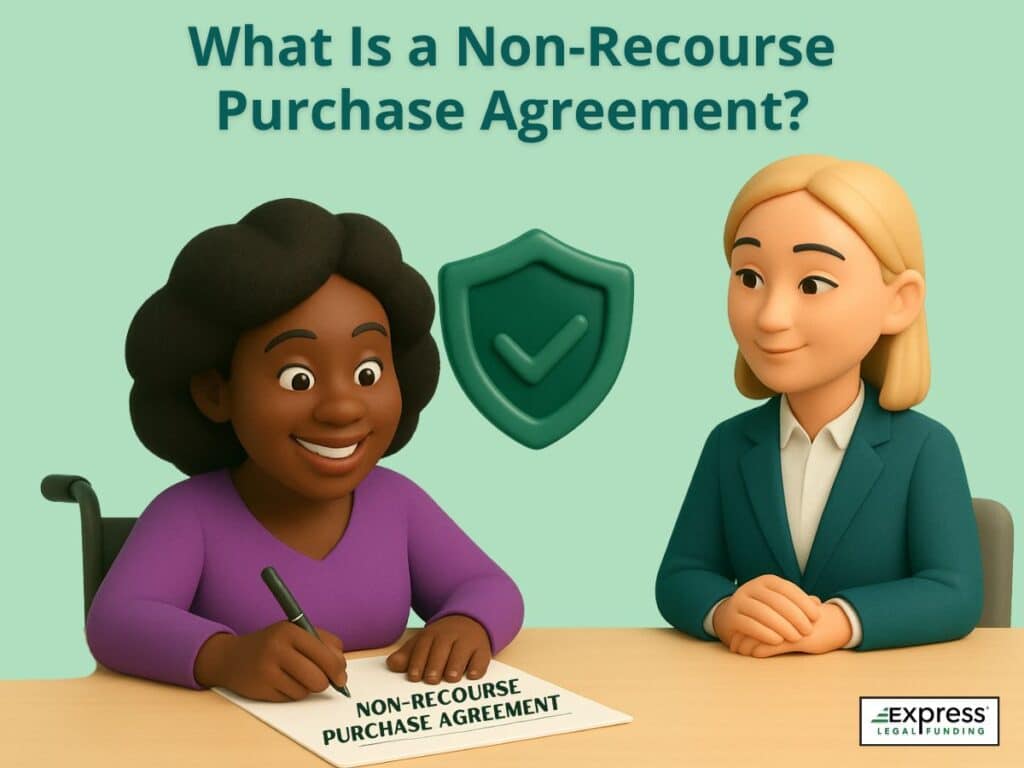
A non-recourse purchase agreement is the legal contract that makes pre-settlement legal funding possible. Instead of giving you a loan, the funding company purchases a portion of your future settlement or judgment, meaning you only repay if you win or settle your case.
If your case is unsuccessful, you owe nothing back, and the company absorbs the loss. This non-recourse structure protects plaintiffs from debt during an already financially stressful time and is what separates lawsuit settlement funding from traditional personal loans.
Key Features of a Non-Recourse Legal Funding Agreement:
- No Personal Liability: You’re never required to repay out of pocket—even if you lose.
- No Credit Checks: Your credit score is never affected or pulled.
- Risk-Free for Plaintiffs: The financial risk is fully shifted to the pre-settlement funding provider.
- Payment Comes from Your Settlement: Repayment for the lawsuit cash advance is required only if your case wins or settles.
This structure allows plaintiffs to pursue fair compensation without being pressured into early settlements just to cover living expenses.
How to Qualify for Legal Funding?
Legal funding is available to plaintiffs with pending lawsuits who need financial support before their case settles. Approval depends on the strength of your legal claim, not your credit score or income.
To qualify for legal funding, you must:
- Have a valid, pending lawsuit: Most commonly, personal injury claims such as car accidents, slip and fall cases, medical malpractice, wrongful death, or civil rights violations.
- Be represented by a licensed attorney: Your lawyer must be working on a contingency fee basis and willing to cooperate with the funding process.
- Have a strong case with merit: Your claim must have a high chance of settling or winning, with clear liability and damages that support a future payout.
Unlike traditional loans, legal funding does not require a credit check, proof of employment, or personal collateral. If your case qualifies, you can receive a non-recourse cash advance and owe nothing back if you lose.
What Role Does My Attorney Play in Legal Funding?
Your attorney plays a crucial role in the legal funding approval process, serving as both a case verifier and a liaison between you and the funding company.
Key responsibilities of your attorney include:
- Providing essential case documents: Your attorney shares case details, medical records, and legal filings to help the funder evaluate the strength of your claim.
- Reviewing and signing the funding agreement: Your attorney must review and sign the contract to confirm that the terms are fair and legally compliant and to accept responsibility for disbursing repayment from your settlement once the case concludes.
- Coordinating repayment after settlement: Once your case settles, your attorney works directly with the provider to repay the advance from the case proceeds.
Learn how your attorney plays a key role in the legal funding process in our guide: Do I Need a Lawyer to Get Legal Funding?
Important Fact: Legal funding cannot move forward without your lawyer's active cooperation. You must have a lawyer who is willing to share case details and sign the funding agreement for your application to be approved.
This collaboration ensures the funding process is smooth, transparent, and aligned with your best legal interests.
What Are the Benefits of Getting Legal Funding?
Legal funding offers plaintiffs critical financial support while their lawsuit is still pending, without adding personal financial risk or monthly debt.
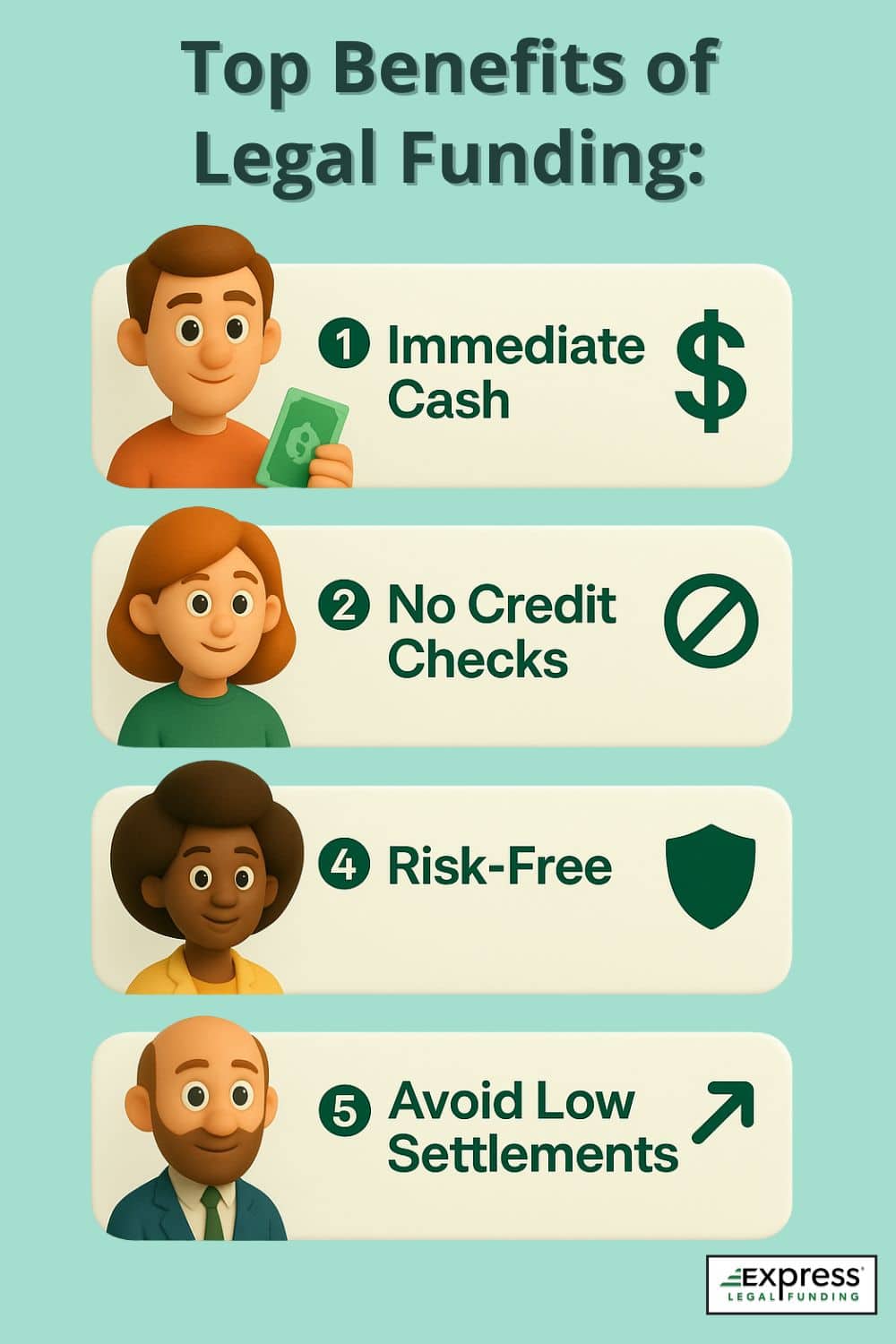
Top Benefits of Legal Funding:
- Immediate cash when you need it most: Use funds to cover rent, medical bills, groceries, or other urgent living expenses during your case.
- No credit checks or monthly payments: Approval is based on your case, not your credit score, income, or employment status.
- Zero risk if you lose: Legal funding is non-recourse, so you owe nothing if your case doesn’t settle or win.
- Reduces pressure to settle early: Financial relief gives your attorney time to fight for the full value of your claim instead of accepting a lowball settlement.
- Peace of mind during stressful litigation: Focus on recovery and legal strategy while your immediate financial needs are covered.
What Are the Drawbacks of Legal Funding?
Legal funding provides fast, risk-free financial relief, but like any financial tool, it comes with trade-offs that plaintiffs should carefully consider before applying.
Potential Drawbacks to Keep in Mind:
- Reduces your final settlement payout: Legal funding is repaid from your case proceeds. The more you borrow, the less you’ll keep after attorney fees and other costs are deducted.
- Costs can increase over time: Legal funding agreements have interest. The longer your case takes to resolve, the more you may owe.
- A good credit score won’t lower your rate or improve approval chances: Legal funding is based solely on your case strength, not your creditworthiness.
- Approval is not guaranteed: Cases with unclear liability, minimal damages, or poor documentation may not qualify for funding.
Pro Tip: Always have your attorney review the funding agreement and make sure you understand all terms before accepting an offer.
What Types of Cases Qualify for Legal Funding?
Legal funding is available for a wide range of civil lawsuits, especially those with strong liability and the potential for a monetary settlement. The most common qualifying case types include:
- Car accidents and personal injury claims – Including motorcycle, truck, pedestrian, and rideshare accidents.
- Slip and fall (premises liability) – Injuries caused by hazardous property conditions or negligent maintenance.
- Medical malpractice – Cases involving surgical errors, misdiagnosis, or negligent care by healthcare providers.
- Workplace or construction accidents – When third-party negligence causes injury on the job.
- Wrongful death claims – Filed by surviving family members seeking compensation after a preventable fatality.
- Employment discrimination or retaliation – Including wrongful termination, harassment, and wage disputes.
- Product liability or defective medical device lawsuits – Claims against manufacturers for dangerous or faulty products.
Frequently Asked Questions About Legal Funding (Answered by Industry Experts)
Is legal funding a loan?
No. Legal funding is not a loan; it's a non-recourse cash advance tied to your lawsuit. You only repay if you win or settle your case, and you owe nothing if you lose.
How much legal funding can I receive?
The amount of legal funding most plaintiffs qualify for is 10% to 20% of their anticipated settlement value. At Express Legal Funding, advances range from $500 to $500,000, depending on your case strength.
How fast can I get legal funding?
If your attorney responds quickly, you may receive funding within 24 to 48 hours of applying. Express Legal Funding uses a streamlined process to ensure fast approvals.
Do I need my attorney’s approval?
Yes. Your attorney must review and sign the funding agreement for your application to proceed. Legal funding cannot be finalized without your lawyer’s cooperation.
Learn more in our detailed guide: Can I Get Pre-Settlement Funding Without Attorney Consent?
What happens if I lose my case?
You owe nothing. Because lawsuit cash advances are non-recourse, you keep the money with no repayment required if your case is unsuccessful.
Is Legal Funding Taxable Income?
No, legal funding is generally not considered taxable income. Because of its non-recourse structure, the IRS does not count it as part of your gross income, so you typically don’t need to report it on your tax return.
Learn more about the taxation status of legal funding in our guide: Do I Have to Pay Taxes on Pre-Settlement Legal Funding?
Is Legal Funding Safe and Regulated?
Yes—legal funding is safe when provided by a reputable company like Express Legal Funding. We prioritize transparency, consumer protection, and full compliance with all applicable laws.
Here’s what makes our legal funding safe:
- Clear, easy-to-read contracts with no hidden terms
- Transparent pricing—no confusing interest structures or heavily compounding interest
- No upfront fees or surprise charges
- 100% non-recourse funding—you only repay if you win
- Compliance with state-specific pre-settlement funding regulations
Plaintiff financing is largely regulated at the state level, and rules vary by jurisdiction. These may include requirements for disclosures, fee caps, and attorney involvement.
At Express Legal Funding, we not only meet but often exceed these standards, advocating for stronger legal protections for plaintiffs nationwide.
Why Plaintiffs Choose and Trust Express Legal Funding
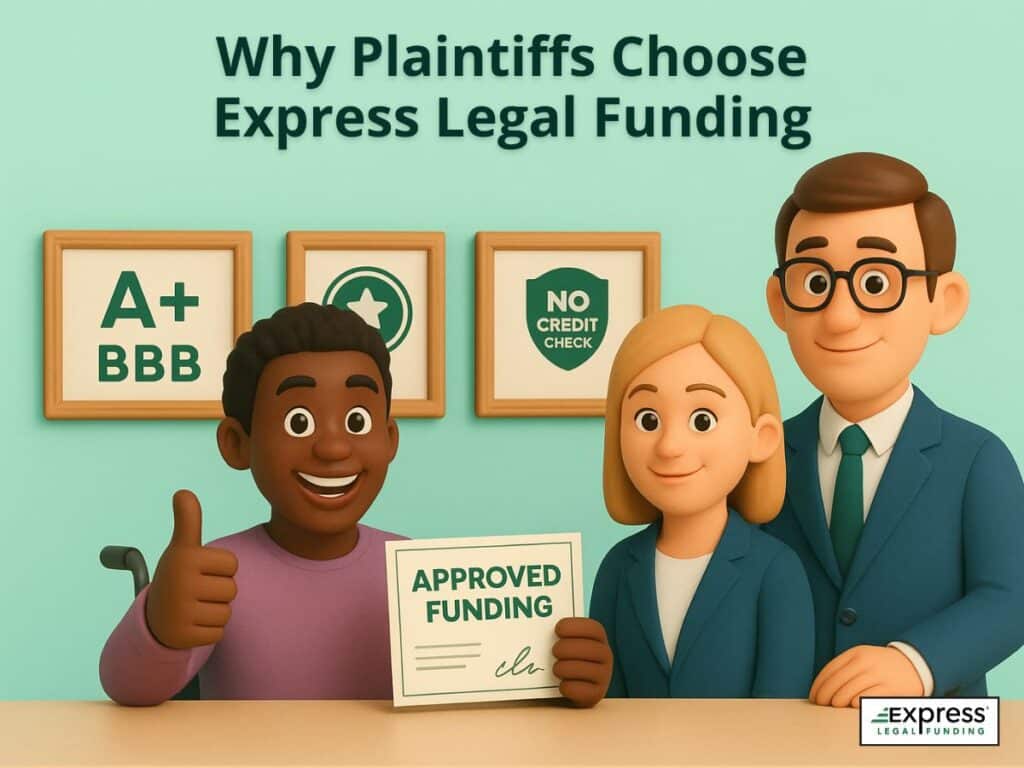
Express Legal Funding stands out as a trusted, plaintiff-first provider of risk-free settlement advances. Here’s why thousands of injured claimants choose us:
- Direct Funder (Not a Broker): We fund cases in-house, so you get faster approvals, lower fees, and more money in your pocket.
- Zero Risk If You Lose: Our guaranteed pre-settlement funding is 100% non-recourse—no repayment is required unless you win or settle.
- No Credit Checks or Upfront Fees: Approval is based solely on your case, not your credit or income.
- Transparent Terms: Our easy-to-read contracts include flat pricing and no hidden fees or heavily compounding interest.
- Top-Rated and Trusted: We’re proud to have an A+ rating with the Better Business Bureau and a track record of helping plaintiffs across the country.
How to Apply for Legal Funding Today
If you're struggling financially while your lawsuit is pending, Express Legal Funding can help you access fast, risk-free cash without any upfront costs or credit checks. Applying is quick, confidential, and entirely obligation-free.
Here’s how to get started:
- Step 1: Call us or apply online in just minutes
- Step 2: We’ll review your case with your attorney
- Step 3: If approved, receive funding in as little as 24 hours
You only repay if you win or settle—otherwise, you owe nothing.
📞 Call us now at (888) 232-9223 or apply online to see how much you qualify for.
Learn More About Legal Funding From These Helpful Resources
Pre-settlement legal funding typically costs 2% to 4% per month. The total repayment depends on the case type, duration, and whether the interest is simple or compounding. Choosing a provider with capped rates and transparent terms, like Express Legal Funding, can help reduce costs and protect more of your settlement.
Waiting for a legal settlement can take months—or even years. That’s why many people turn to legal funding, also known as lawsuit loans, to help pay bills while their case is ongoing. But one of the first questions they ask is:
“How Much Will Pre-Settlement Legal Funding Cost Me?”
The exact cost of legal funding depends on several factors, including the provider you choose, the details of your case, and how long it takes to reach a settlement.
This guide breaks down typical legal funding rates, explains how repayment works, and shows you how to avoid hidden fees and paying too much.
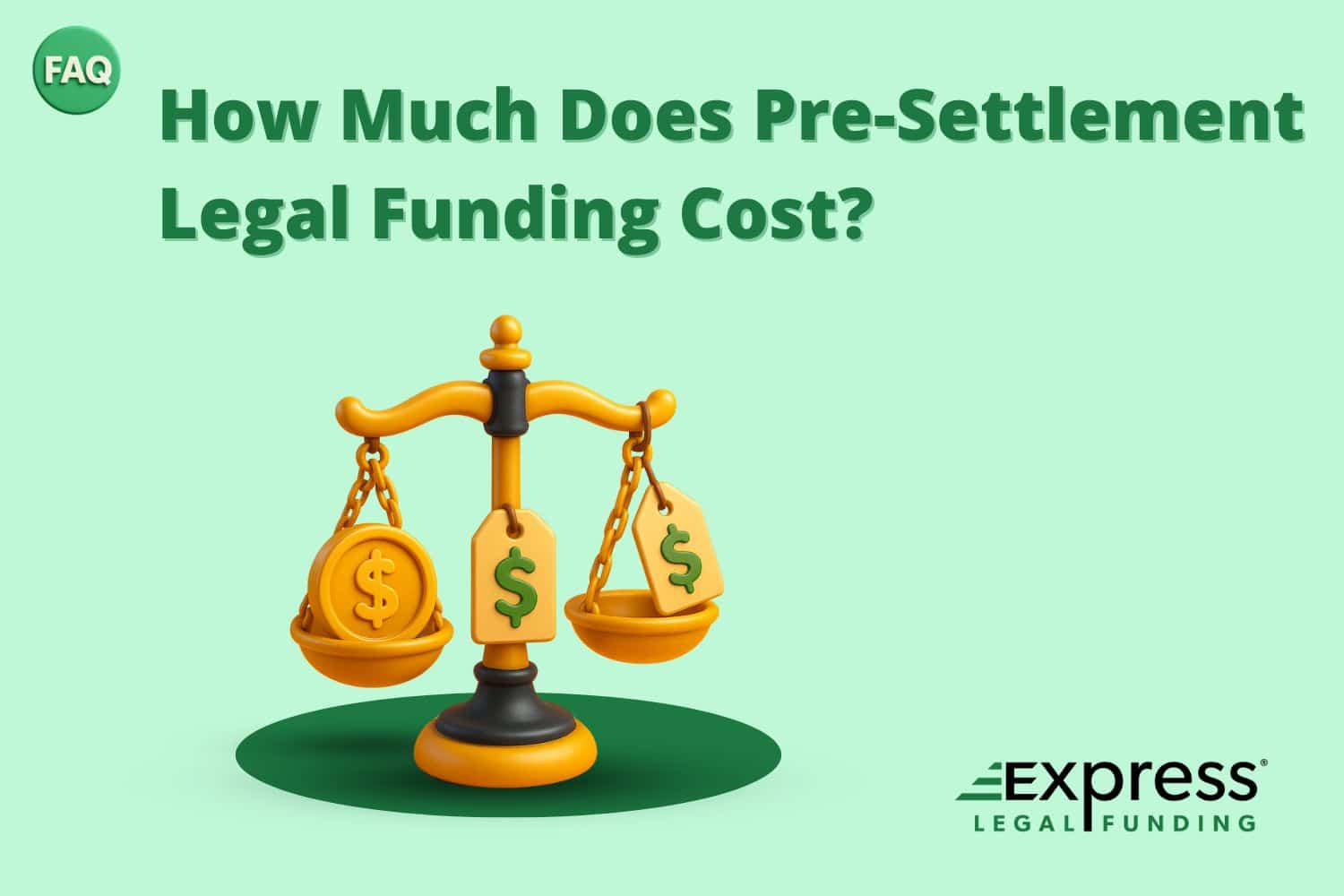
Disclaimer: All rates, fees, and repayment examples provided are for illustrative purposes only and do not constitute a guarantee, offer, or commitment to fund. Actual terms may vary based on individual case details, applicable state laws, and underwriting approval.
Please review your agreement carefully before accepting any funding.
What Is Legal Funding?
Legal funding is a cash advance provided to plaintiffs with active legal claims. It is not a traditional loan. Instead, it’s classified as non-recourse funding, which means:
- You only repay the advance if you win or settle your case.
- If you lose, you owe nothing—there is no personal liability.
- Approval is based on the strength of your case, not your credit score or employment history.
Legal funding helps plaintiffs cover essential living expenses during long legal battles without taking on personal debt.
Types of Legal Funding
The most common types of legal funding include:
- Pre-settlement funding: Given while your case is still open.
- Post-settlement funding: Offered after your case is won but before the payout is received.
- Medical lien funding: Pays medical bills upfront in exchange for repayment from your settlement.
How Legal Funding Costs Are Calculated
The cost of legal funding isn't one-size-fits-all. Funding companies evaluate several factors to determine your rates and repayment terms. Understanding what drives these costs can help you compare offers and avoid overpaying.
Here are the main factors that influence how much legal funding will cost:
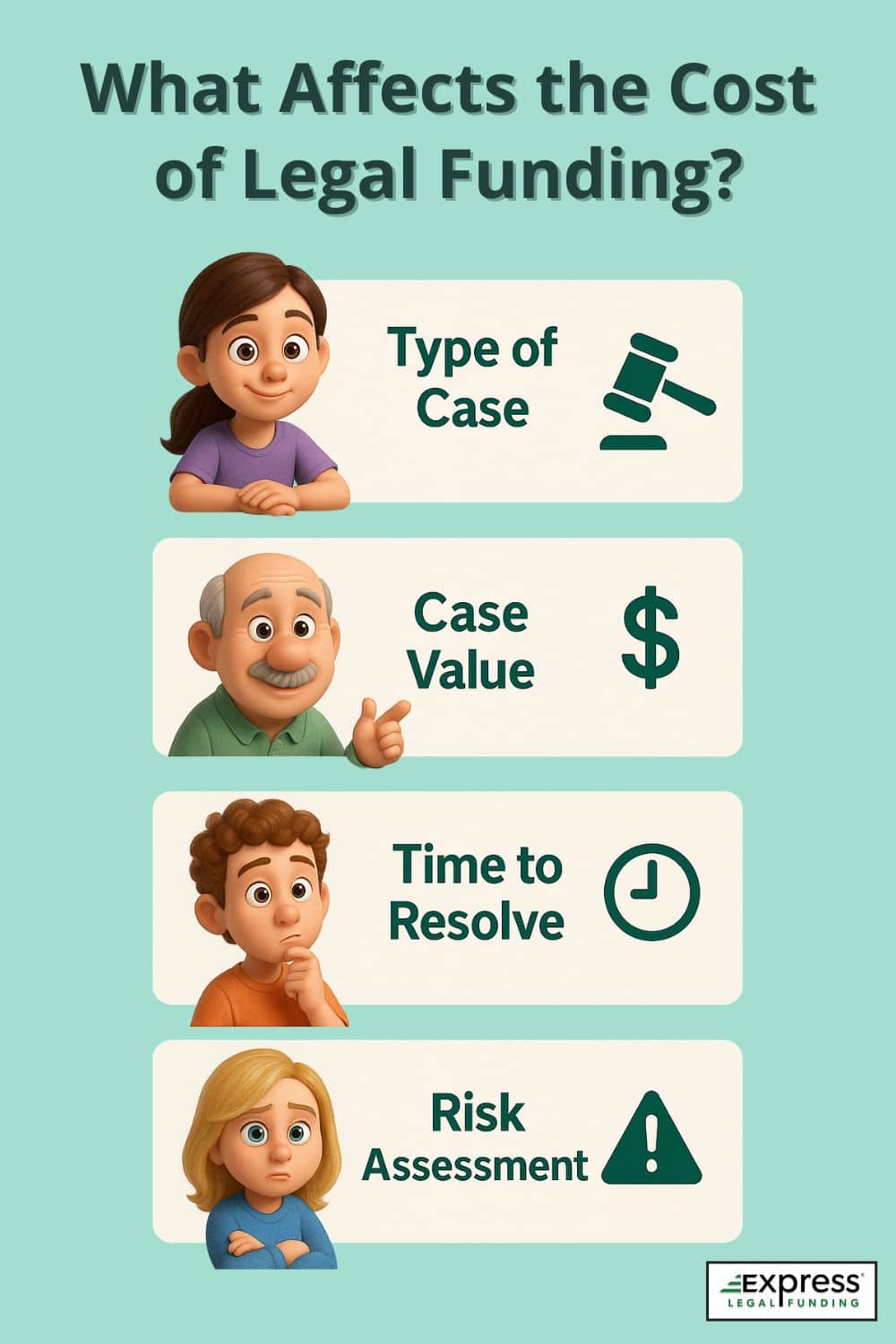
1. Type of Case
Not all cases carry the same risk. Common examples include:
- Car accidents with clear liability may receive lower rates.
- Medical malpractice or product liability cases often involve more uncertainty and higher costs.
The more predictable the case outcome, the more favorable the pricing may be.
2. Estimated Case Value
Larger expected settlements usually qualify for higher funding amounts. However:
- Higher case value can reduce perceived risk, lowering your rate.
- But higher funding requests may result in larger total repayment amounts over time.
3. Time Until Case Resolution
Legal funding accrues costs over time, so the longer your case takes to settle, the more fees and interest can accumulate, especially if compounding interest is involved.
Tip: Choose a trustworthy legal funding provider with non-compounding interest and capped repayment terms to reduce long-term costs.
4. Risk Assessment
Funding is non-recourse, meaning you don’t repay unless you win. So, the more risk your case presents, the more a provider may charge to offset that risk.
Factors that raise the risk include:
- Unclear liability
- Incomplete medical records
- Delayed or disputed treatment
Legal funding companies use different ways to charge for their services. Some charge monthly interest, while others use flat fees. The next section explains how each method works and how it affects what you’ll pay back.
What Fees Do Pre-Settlement Funding Companies Charge?
Pre-settlement funding companies often apply a range of fees when offering cash advances on pending lawsuits, and these charges can vary widely depending on the provider and case specifics. Common fee types include:
- Monthly interest rates: Typically 2% to 4%, charged as simple or compounding interest
- Application or processing fees: Sometimes deducted from the upfront advance
- Underwriting or administrative costs: Additional fees for reviewing the case
- Broker markups: Extra charges if the provider uses a third-party broker instead of direct funding
Explore the Guide: Legal Funding Brokers vs. Lawsuit Loan Companies - Learn the differences
Tip: Always ask whether fees are deducted from your advance and if there's a cap on total interest to avoid paying more than expected.
[ninja_tables id="22291"]Why Choose Express Legal Funding Instead of Other Companies?
- No Upfront or Hidden Fees: Transparent terms with zero surprise charges.
- Capped Fees: Fees are capped to help protect your settlement.
- Free Delivery of Funds: No extra charge to receive your money.
- Free, No-Obligation Case Review: Fast approval process without any risk.
- 100% Risk-Free Guarantee: You only repay if you win or settle your case—no win, no repayment.
Simple vs. Compound Interest Rates: What It Means for You
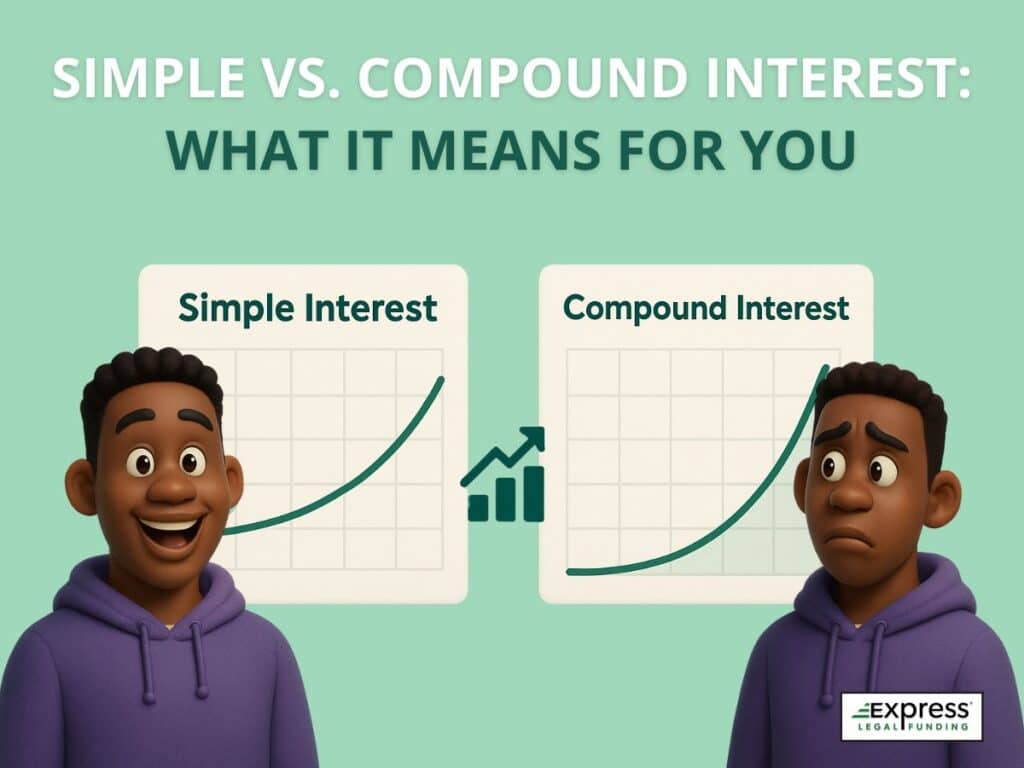
Simple Interest:
- Based only on the amount you borrow.
- Easier to predict.
- Lower total repayment.
Compound Interest:
- Interest is charged on both the amount you borrowed and the interest already added.
- Costs grow faster the longer your case takes.
- Can double or triple your repayment.
Express Legal Funding only uses low interest rates with optional caps to protect your settlement.
Examples: How Much You Might Repay for the Cost of Pre-Settlement Funding
Here are real-world examples to show how much legal funding can cost depending on the provider:
[ninja_tables id="22292"]What This Means:
Even a small monthly compounding interest rate (3%) can double or triple the total repayment amount if your case takes a year or more to resolve. That’s why it's crucial to ask about:
- Whether the rate is compounding or flat
- Whether there’s a cap on total repayment
Why Simple Interest Matters:
- Simple interest is calculated only on the original funding amount, not on the interest that’s already added.
- This keeps your repayment amount predictable and fair, especially for longer cases.
Real Example: How Much Did Emily Repay on Her Legal Funding?
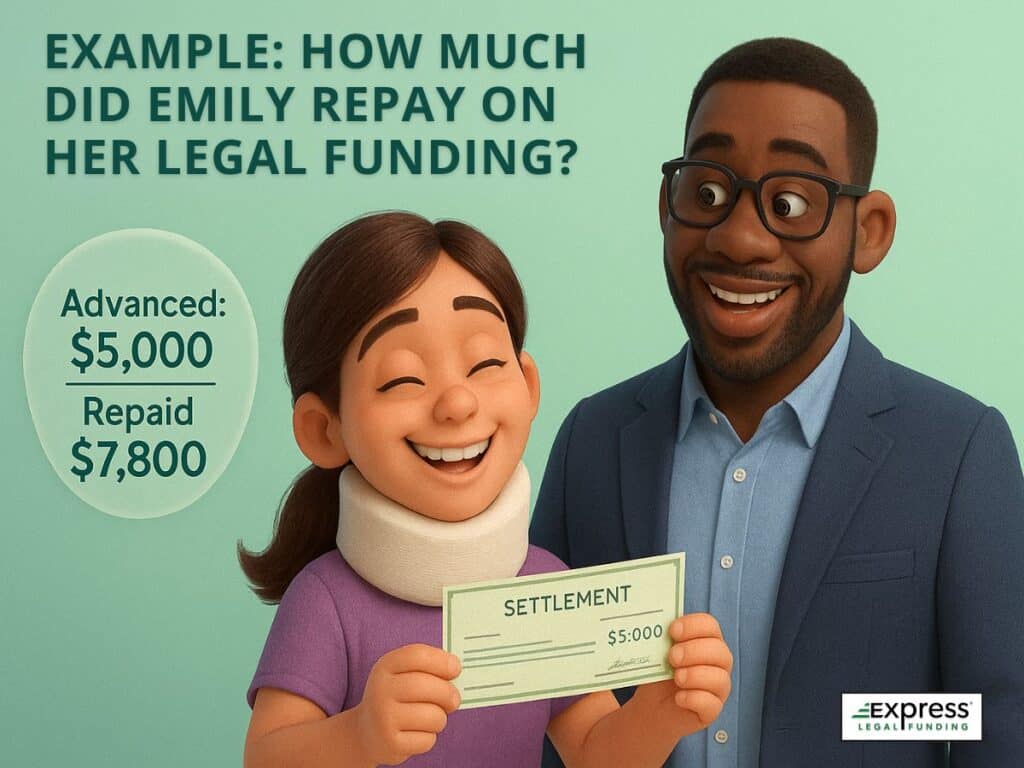
Emily was injured in a rear-end car accident and couldn’t work while waiting for her case to settle. She applied for legal funding to help cover her rent and groceries.
- Settlement Advance Amount: $5,000
- Repayment Type: Simple interest (3% monthly, capped after 24 months)
- Case Duration: 18 months
When Emily’s case finally settled, her attorney paid back $7,800 from her settlement, covering the original funding amount and interest. Thanks to the company’s non-compounding and capped fee model, she avoided the ballooning costs that many other providers would have charged.
💡 Had she chosen a provider using monthly compounding interest, her repayment could have exceeded $9,000.
Are There Upfront or Hidden Fees?
Yes, some pre-settlement funding companies add extra fees that aren’t always obvious at first. These hidden costs can significantly increase your total repayment, sometimes by hundreds or even thousands of dollars.
Common hidden or upfront fees may include:
- Application or processing fees
- Underwriting or administrative fees
- Broker markups (especially if the provider is not a direct funder)
- “Compliance” or “setup” charges
- Servicing and maintenance fees
- Electronic document storage fees
Tip: Always request a clear breakdown of all fees before signing. Look for companies that offer transparent, no-fee funding, like Express Legal Funding.
Watch Out for Upfront Deductions
Some legal funding companies may deduct fees directly from your advance, meaning you receive less money upfront than what you were approved for. Worse, you may still be charged interest on the full funded amount, including the portion you never actually received.
These upfront deductions can include:
- Application fees
- Processing or underwriting fees
- Broker or referral markups
- Delivery fees
Tip: Always ask whether the advance amount listed is net or gross and whether any fees are taken out before the funds are disbursed.
Are There Any Hidden Fees with Express Legal Funding?
No, there are absolutely no hidden fees with Express Legal Funding. Transparency is one of the core principles that sets us apart and is widely recognized by both clients and attorneys.
Express Legal Funding has no upfront fees or hidden costs. Every term is clearly explained in your agreement before you sign—there are no application fees, no surprise charges, and no out-of-pocket costs. You only pay if you win your case, and because our pre-settlement funding is non-recourse, you owe nothing if you lose.
How Does Repayment Work for Legal Funding?
Repayment is simple. Here’s how it works:
- Your case settles.
- Your lawyer receives the settlement check.
- The funding amount + agreed fees and interest are repaid from the settlement to the legal funding company.
- You get the rest of the money.
Legal funding has no monthly payments, no credit reporting, and no debt collection. If you lose your case, you owe nothing.
Can I Estimate My Legal Funding Cost?
Yes, you can estimate potential costs using a legal funding calculator or by reviewing a sample repayment table like the one below.
Please note: these examples are for illustration purposes only and do not represent an offer or pricing from Express Legal Funding. Actual rates, funding amounts, and eligibility are determined on a case-by-case basis and may vary depending on your case details and applicable state laws.
[ninja_tables id="22294"]This helps you:
- Understand how long-term cases affect repayment
- Compare offers from different companies
- Avoid overpaying for short-term cash relief
Want a free cost estimate for your legal funding? Contact us, and we’ll show you exactly what you’ll owe—before you commit.
What to Look for in a Legal Funding Company
Not all lawsuit funding companies are created equal. Here’s what to check:
- Transparent contracts
- Low interest rates
- No hidden fees
- Capped repayment options
- Direct funding (not a broker)
- Attorney-friendly process
Watch out for:
- Complex or unclear terms
- Pushy salespeople
- Promises of “guaranteed funding” with no case review
- Unregulated or offshore companies
Risks to Consider
While legal funding offers financial relief, it’s important to understand the trade-offs:
Risks:
- Less money left after your case settles
- High rates from some providers
- Longer cases can cost more if there’s no fee cap
How to Minimize Risk:
- Only borrow what you need
- Read the contract closely
- Ask about caps and interest types
- Get your attorney’s input
Read our 2025 legal funding company comparison guide to find and choose the best pre-settlement funding provider for your needs.
How to Apply for Legal Funding
At Express Legal Funding, getting started is quick and free:
Legal Funding Process Steps
- Apply online or call us for a free review.
- We contact your attorney to confirm your case details.
- Our team reviews your case and makes an offer.
- You sign the contract.
- We send the money, often the same day your contract is signed.
There’s no cost to apply and no obligation to accept.
Final Thoughts: Is Legal Funding Worth the Cost?
Legal funding helps injured plaintiffs access the cash when they need it most. But it’s crucial to understand the costs and choose a trustworthy provider.
By working with Express Legal Funding, you can:
- Avoid excessive fees
- Get simple, capped pricing
- Non-recourse funding: Only pay if you win
Apply With Express Legal Funding Today
Get the financial help you need. Apply for legal funding online or call us at 888-232-9223 to speak with a team member today.
Still have questions? Contact us for a free, no-pressure quote and find out how much you qualify for.
No, you generally do not have to pay taxes on pre-settlement legal funding, especially in personal injury cases. It is treated as a non-recourse advance on your future settlement, meaning you only repay it if you win. Because it’s not considered income, the IRS does not include it in your gross income, and you don’t need to report it on your tax return. This makes pre-settlement funding a tax-free way to access money during a pending lawsuit.
FAQ: Do You Have to Pay Taxes on Pre-Settlement Legal Funding?
Pre-settlement funding, also known as a pending lawsuit loan or cash advance, is typically not treated as taxable income. Since it is structured as a non-recourse advance on your expected settlement, the Internal Revenue Service (IRS) does not include it in your gross income.
This means most plaintiffs do not need to report the funds on their tax return or pay taxes on the amount received.
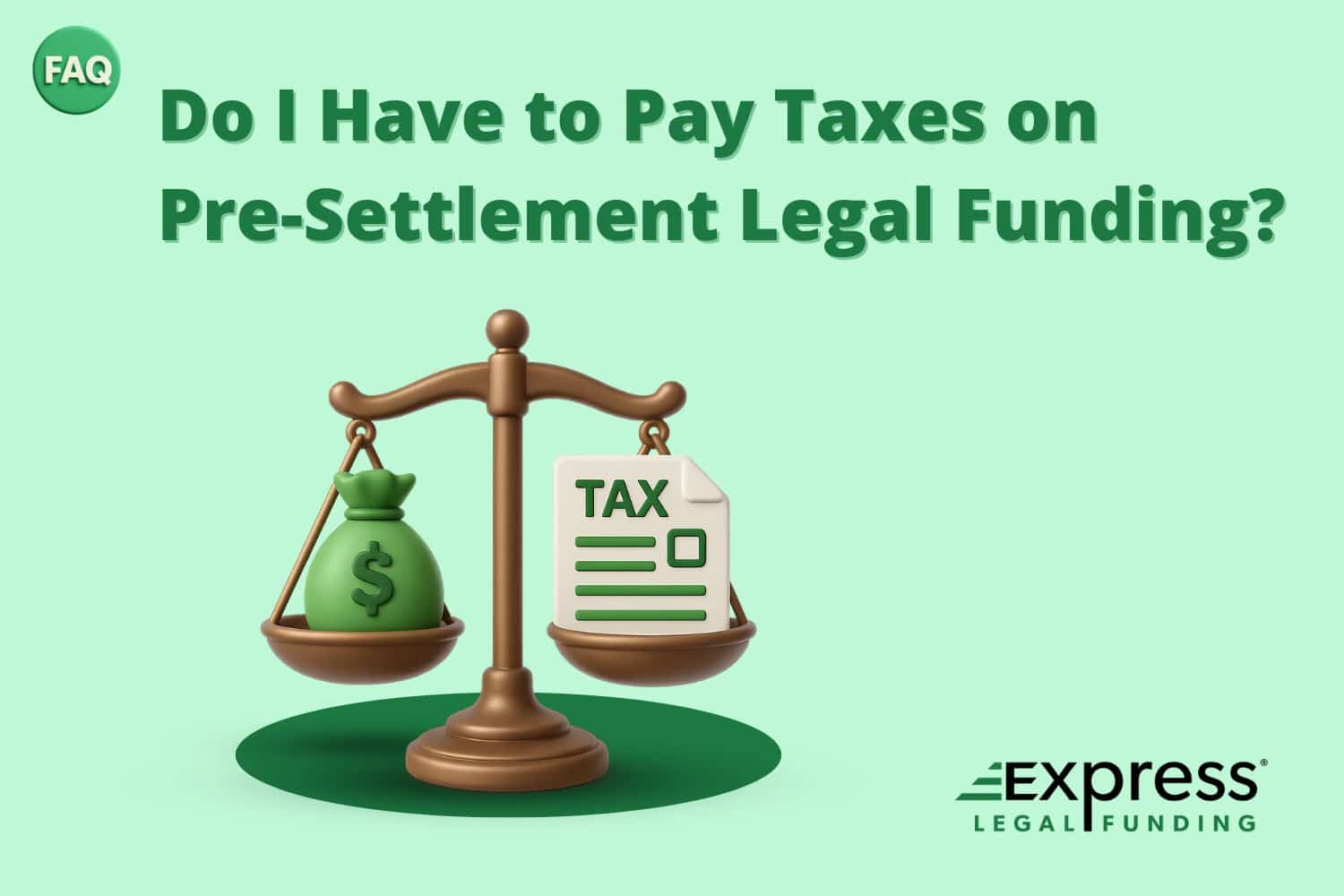
However, there are a few important exceptions and tax-related considerations to keep in mind.
The FAQs below offer a clear and comprehensive explanation of how pre-settlement funding is treated for tax purposes.
Is Pre-Settlement Funding Considered Taxable Income?
No. Pre-settlement funding is not considered taxable income because it’s structured as a non-recourse debt (loan) rather than earned income.
In other words, it’s money you’re borrowing against your expected settlement, which you’ll pay back if you win your case (with no obligation if you lose).
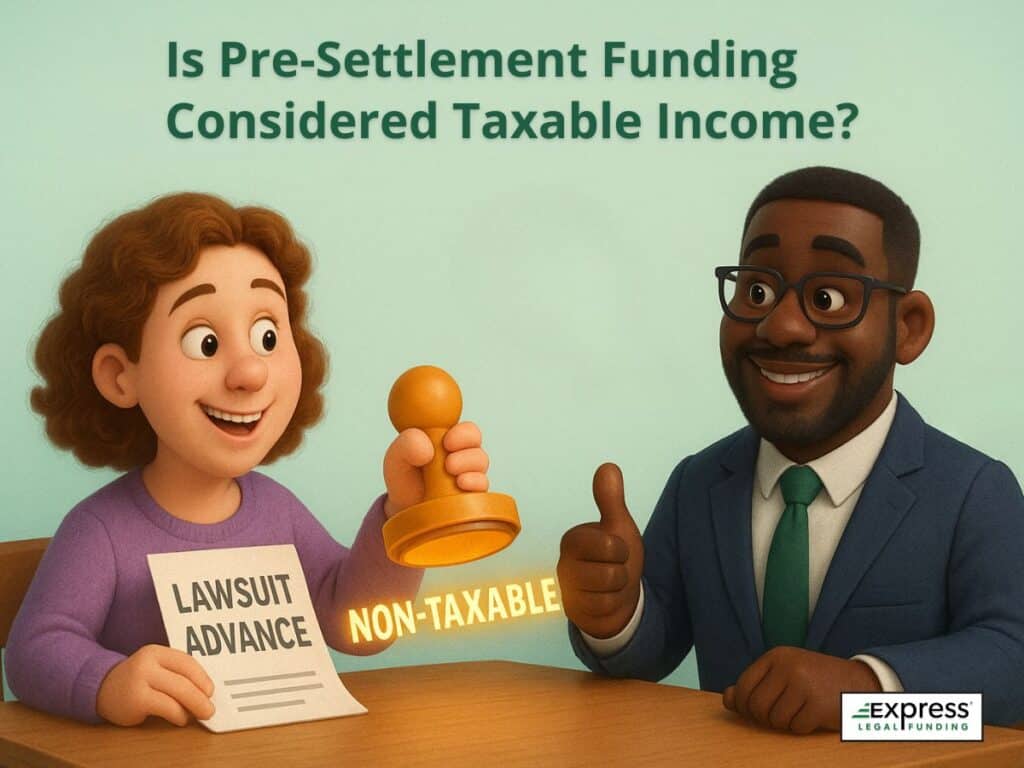
Since it’s not wages or payment for services, the IRS does not treat it as income to you.
- IRS Classification: The Internal Revenue Service classifies most lawsuit funding as “non-recourse” advances, meaning repayment depends on winning the case. This exemption keeps the funds tax-free for the plaintiff.
- No Income Reporting: Because it’s not income, you don’t report the funding on your tax return, and no income taxes are due on it.
Do I Need to Report Pre-Settlement Funding on My Tax Return?
Generally, no. Since pre-settlement funding is not taxable income, there is no requirement to report it on your federal tax return. When filing taxes, you do not list the lawsuit advance as income or as a loan. It stands apart from your taxable earnings for the year.
This holds true for both federal and typically state taxes as well (though state laws can vary, so consult a tax advisor if in doubt).
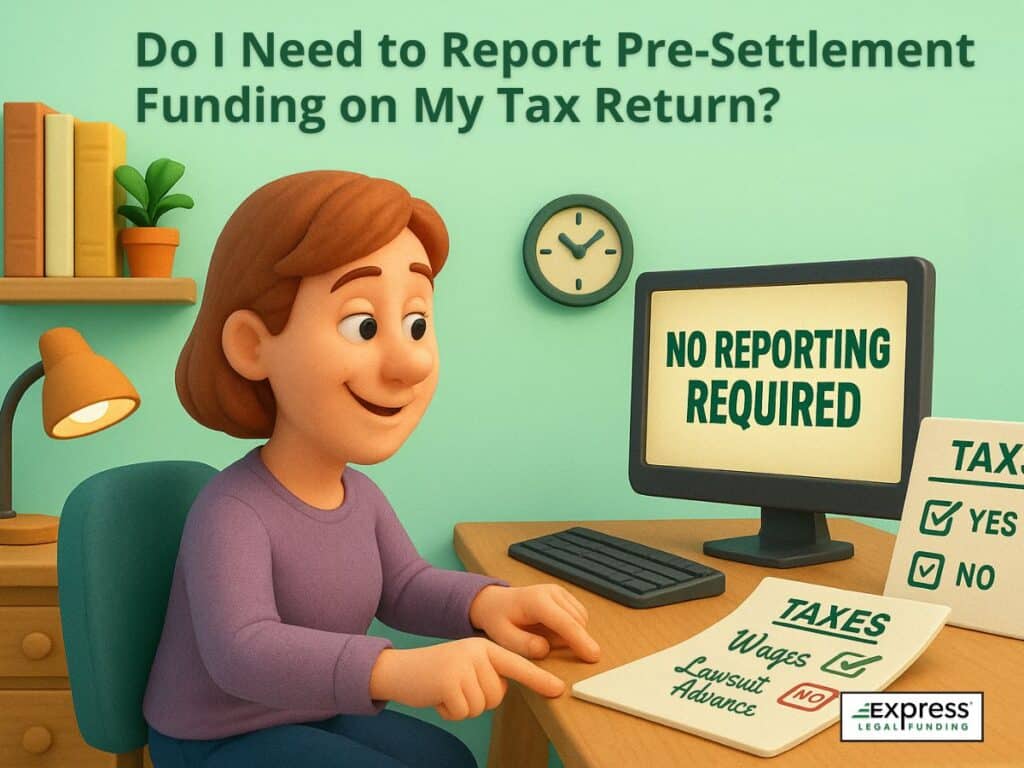
However, it’s wise to keep records of any legal funding transactions and consult your attorney or a tax professional for your specific situation.
In rare or complex cases (e.g., if your lawsuit is not a personal injury case), a tax advisor can confirm that no reporting is needed or guide you if any special circumstance applies.
But for a standard personal injury plaintiff, no tax forms and no reporting of the settlement advance are required.
Why Is Pre-Settlement Legal Funding Not Taxed?
Pre-settlement legal funding escapes taxation because of how it’s characterized under the law. It’s essentially a contingent loan/advance rather than income. Key reasons it’s not taxed include:
- Non-Recourse Advance: Pre-settlement funding agreements are non-recourse, meaning if you lose the case, you don’t have to repay the advance. This structure means the money isn’t guaranteed income or enrichment for you – it’s contingent on a future settlement. The IRS generally does not tax loan proceeds (since loans must be repaid), and because this advance functions like a loan against your settlement, it isn’t taxed.
- Not Wages or Earnings: The cash you receive is not payment for work, services, or product – it’s simply your own potential settlement money early. The IRS excludes from income any damages received for personal physical injuries (see IRC § 104(a)(2)). Since legal funding gives you a portion of those damages in advance, it carries the same tax-exempt status as the settlement itself (in personal injury cases).
- Nature of Personal Injury Settlements: If your case is a personal injury case, the underlying settlement (for physical injuries) is tax-free by law. The advance is drawn from that non-taxable settlement pool, so the advance itself is likewise tax-free to you.
In summary, lawsuit advances are viewed as temporary financial help (to be repaid from the settlement) and not as new income. This is why you don’t pay taxes on them in most instances.
Are Lawsuit Loans or Pre-Settlement Advances Taxable?
In most cases, no. Lawsuit loans and pre-settlement advances are not taxable in the U.S. Like pre-settlement funding, other forms of litigation funding or lawsuit loans follow the same principle: they are advances on expected recoveries, not earned money.
Thus, recipients are not taxed on the funds at the time of receipt. You won’t receive a 1099 for a lawsuit loan disbursement, and you don’t list it as income on your tax filings.
Even if you see terms like “loan” or “interest” in the agreement, remember this is a special non-recourse loan – no repayment if you lose, and repayment (if you win) comes out of the settlement itself. Because of this structure, the IRS does not treat it as taxable income or forgiveness of debt.
In contrast, a typical bank loan that gets forgiven could trigger cancellation-of-debt income tax, but a pre-settlement advance is different, since it’s contingent and tied to a legal claim outcome.
Important: The tax treatment can change after your case resolves (when you actually receive a settlement or judgment). The advance itself remains non-taxable, but any monetary award you win might have taxable components. The key point here is that the act of receiving a lawsuit loan or advance is not a taxable event.
Are Personal Injury Settlements Taxable (and Does That Affect the Advance)?
Most personal injury settlements are not taxable, which is why the advances on them are also tax-free. Under U.S. tax law (IRC Section 104), compensatory damages for physical injuries or physical sickness are excluded from taxable income.
For example, if you settle a bodily injury claim (like a car accident or slip-and-fall), the money for your medical bills, pain and suffering, property damage, lost wages due to physical injury, etc., is generally tax-free at the federal level.
Since pre-settlement funding in personal injury cases is drawn from these non-taxable damages, it inherits the same tax-free status.
Taxation of Legal Settlements and Judgments
However, some types of lawsuit payouts are taxable, and it’s useful for plaintiffs to know these differences (though they don’t change the upfront funding’s tax status):
- Punitive Damages: These awards are meant to punish the defendant for egregious misconduct and to deter similar future behavior. Unlike compensatory damages, punitive damages are taxable income to the plaintiff.
- Lost Wages / Employment Claims: If part of your lawsuit is compensation for lost wages or back pay, that portion is taxable – it replaces taxable salary.
- Emotional Distress (non-physical): Damages for emotional distress or mental anguish not caused by physical injury are taxable. If it’s linked to a physical injury, it may be non-taxable.
- Interest on Settlement: Any pre-judgment or post-judgment interest that accrues on your award is taxable.
- Non-Injury Claims: Settlements for non-physical claims (e.g., defamation) are typically taxable.
Example: Jane’s personal injury case settles for $100,000: $80,000 for physical injuries (tax-free), $20,000 for punitive damages (taxable). If Jane took a $10,000 lawsuit cash advance, that advance wasn’t taxed when received. She will repay it from her settlement, and only the $20,000 punitive portion is taxed.
Will Taking a Pre-Settlement Advance Affect How Much I Pay in Taxes on My Settlement?
Not directly. Taking pre-settlement funding does not change the tax treatment of your settlement – it simply reduces the net amount you receive at the end. You won’t owe any tax on the advance itself, but you still owe taxes on any taxable portion of your settlement.
You’re generally considered to have received the full settlement, even though some of it went to repay the funder. The IRS still taxes the full taxable portion.
However, since your final disbursement may be smaller after fees, your actual tax payment that year could be lower due to reduced income in hand, but the tax liability remains based on the original taxable settlement amount.
Relevant FAQ guide: How Much Does Pre-Settlement Legal Funding Cost?
What Happens if I Use My Pre-Settlement Funds for Investments or Non-Essential Purchases?
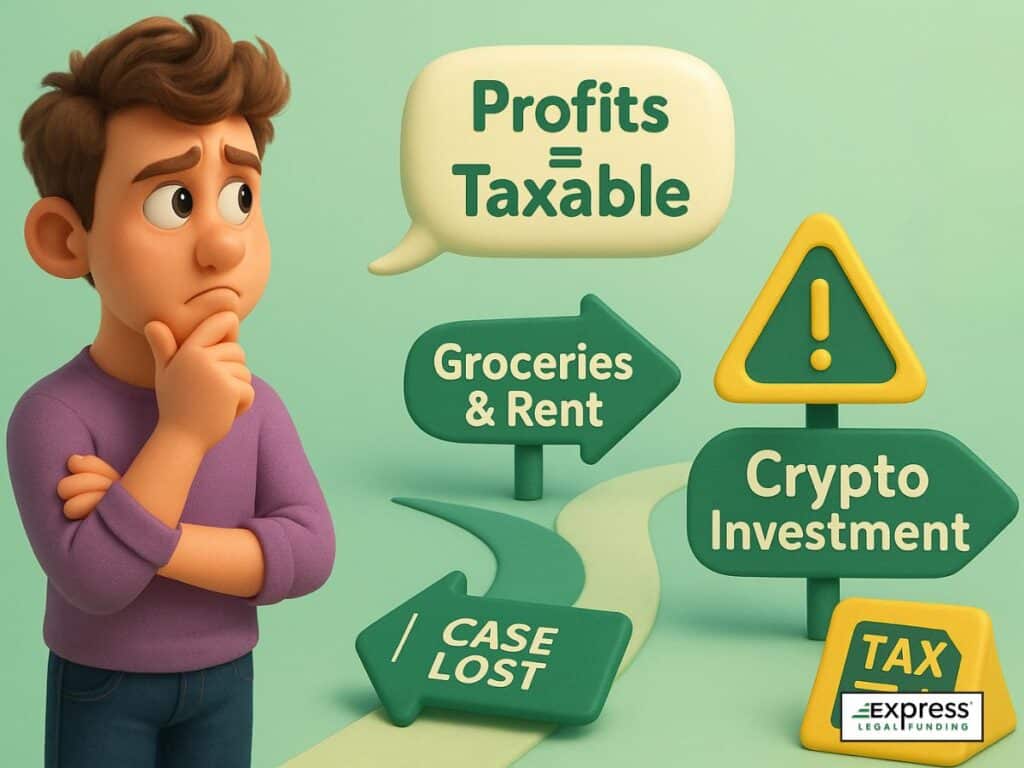
The advance itself remains non-taxable, but any profits or gains from investing the funds are taxable. For instance, if you invest your advance and make a profit, that gain is subject to normal capital gains or business income tax.
That said, experts recommend using the funds only for necessary living expenses to avoid unnecessary costs.
The IRS focuses on whether new income is generated, not where the money came from. So, while the advance isn't taxed, using it to create taxable income (like from an investment) will result in tax obligations.
If I Lose My Case, Do I Owe Taxes on the Pre-Settlement Funding I Received?
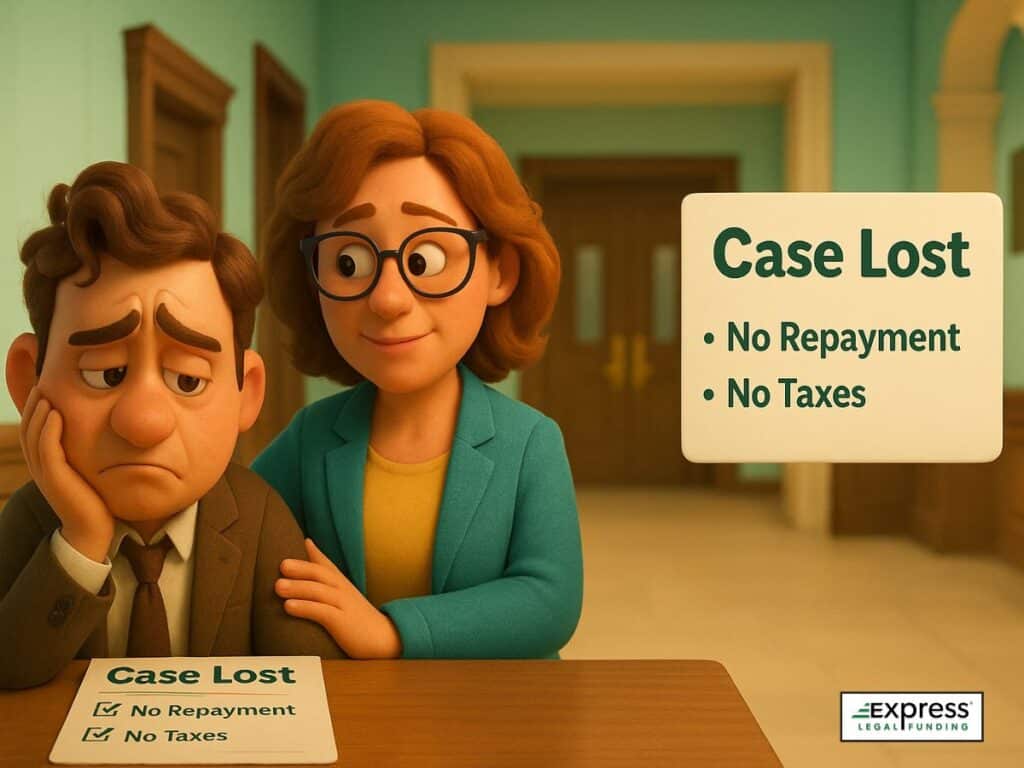
No. If you lose your case, you don’t repay the funding, and you don’t owe taxes on it either. Lawsuit advances are non-recourse, meaning the funding company assumes the risk. The IRS doesn’t consider these advances as income in the event of non-repayment.
Unlike typical forgiven loans, which can trigger cancellation-of-debt tax liability, lawsuit funding is structured to be contingent from the start. So, no 1099-C is issued, and no tax is due.
Will I Receive a 1099 or Tax Form for Pre-Settlement Funds?
No, not for the funding itself. Legal funding companies do not issue 1099s for advances because they aren’t wages or income. However, you might receive a 1099 for the settlement itself, particularly if it includes punitive damages, interest, or other taxable elements.
If your entire settlement is tax-free (e.g., for personal physical injury), no 1099 is typically issued. But if you receive one, consult your attorney or tax advisor to properly report any taxable portions.
Does Pre-Settlement Funding Affect My Credit or Financial Situation (Beyond Taxes)?
No, it doesn’t impact your credit score. Pre-settlement funding is not reported to credit bureaus and does not require a credit check. Because it’s non-recourse and tied to your lawsuit, it doesn’t appear on your credit report or affect your score even if you lose your case.
Need Fast Pre-Settlement Funding? Apply Today with Express Legal Funding
Waiting on your lawsuit shouldn’t mean falling behind on bills. At Express Legal Funding, we offer fast, risk-free pre-settlement cash advances to help you stay financially stable while your case moves forward.
- No income verification.
- No credit checks.
- No monthly payments
- No repayment if you lose.
Apply today, and you can receive the funds you need within 24 hours of approval. Thousands of satisfied clients have trusted Express Legal Funding for fast and reliable financial support while waiting for their settlements.
👉 Apply for Legal Funding or call us directly at (888) 232-9223 for immediate assistance.
No. Reputable pre-settlement funding companies, including Express Legal Funding, do not require a credit check, and applying will not impact your credit score. Approval is based entirely on the strength and potential value of your lawsuit, not your credit history, income, or employment. This ensures plaintiffs with poor or no credit can still access the funds they need without risking damage to their credit report.
Why Pre-Settlement Funding Does Not Require a Credit Check
Pre-settlement funding, also called a lawsuit loan, is a non-recourse cash advance against your future settlement, not a traditional loan. Because repayment is only required if you win or settle your case, personal credit history and finances are not part of the lawsuit loan approval process.
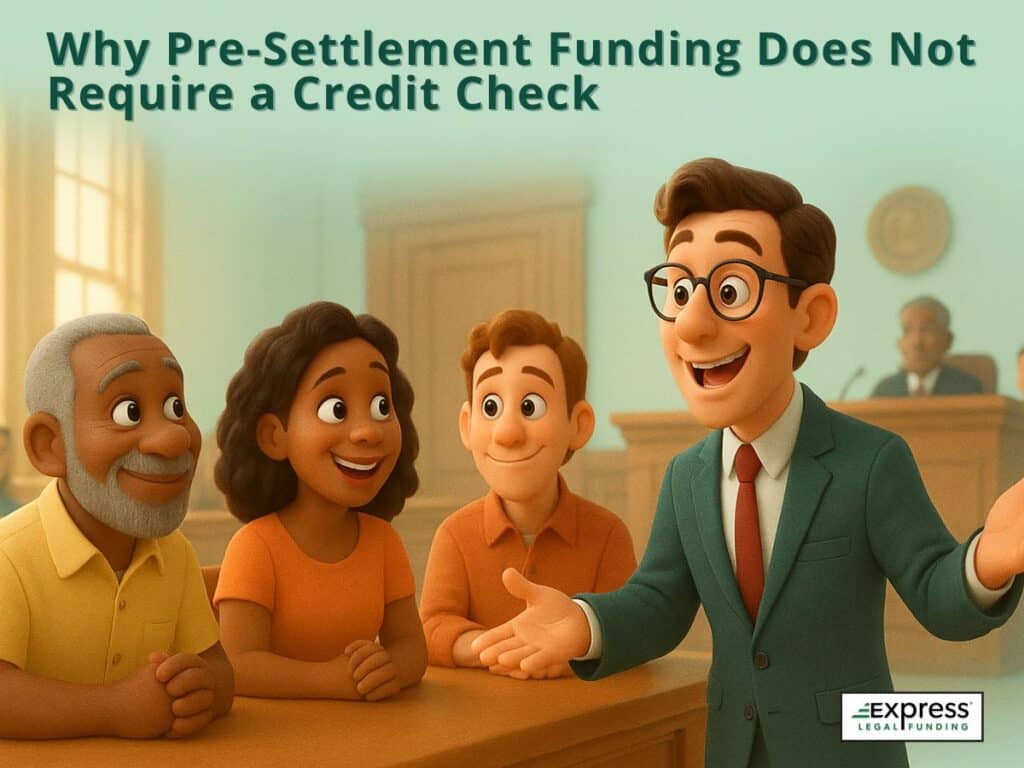
Legal funding companies instead review:
- The facts and evidence of your case.
- The estimated settlement value.
- Basic case information from your attorney to verify details.
Since repayment comes directly from your settlement proceeds, there is no credit inquiry, no impact on your credit score, and no debt owed if your case is unsuccessful.
Relevant FAQ guide: What Is Non-Recourse Legal Funding?
Will Pre-Settlement Funding Affect My Credit Score or Report?
No. Applying for or receiving pre-settlement funding will not affect your credit score or appear on your credit report. It is not a traditional loan, so it is not reported to credit bureaus. Repayment is handled by your attorney at the end of the case, meaning no worries of missed payments or delinquent accounts.
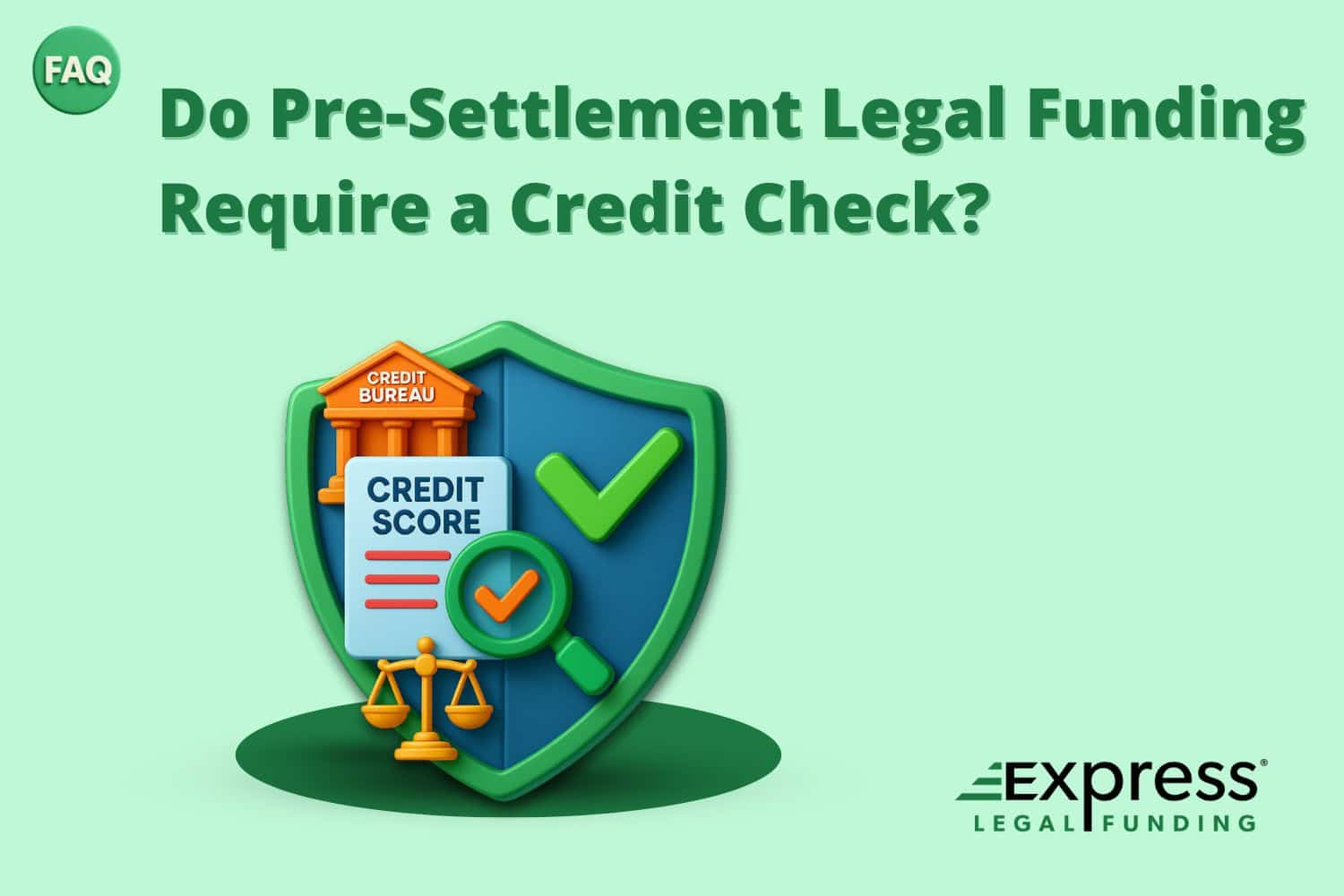
No Impact on Your Credit Score
Pre-settlement funding is a non-recourse cash advance, not a traditional loan. That means:
- No hard or soft credit checks are performed.
- Your credit score remains unchanged whether you are approved or not.
- Because repayment only occurs if you win or settle, there are no late payments or defaults that could harm your credit.
Not Reported to Credit Bureaus
Pre-settlement funding is not reported to major credit bureaus like Equifax, Experian, or TransUnion. This ensures:
- No new accounts are added to your credit file.
- No debt collection entries appear if your case is unsuccessful.
- Your credit report remains completely unaffected by applying for or receiving legal funding.
By separating funding approval from credit history, legal funding provides a way for plaintiffs to access financial relief without leaving any trace on their credit profile or putting their score at risk.
🟢 Ready to get started? Apply for Pre-Settlement Legal Funding Online
Credit Check and Credit Reporting: Pre-Settlement Funding vs. Bank Loans and Credit Cards
[ninja_tables id="22647"]Why Don’t Lawsuit Loan Companies Check Credit?
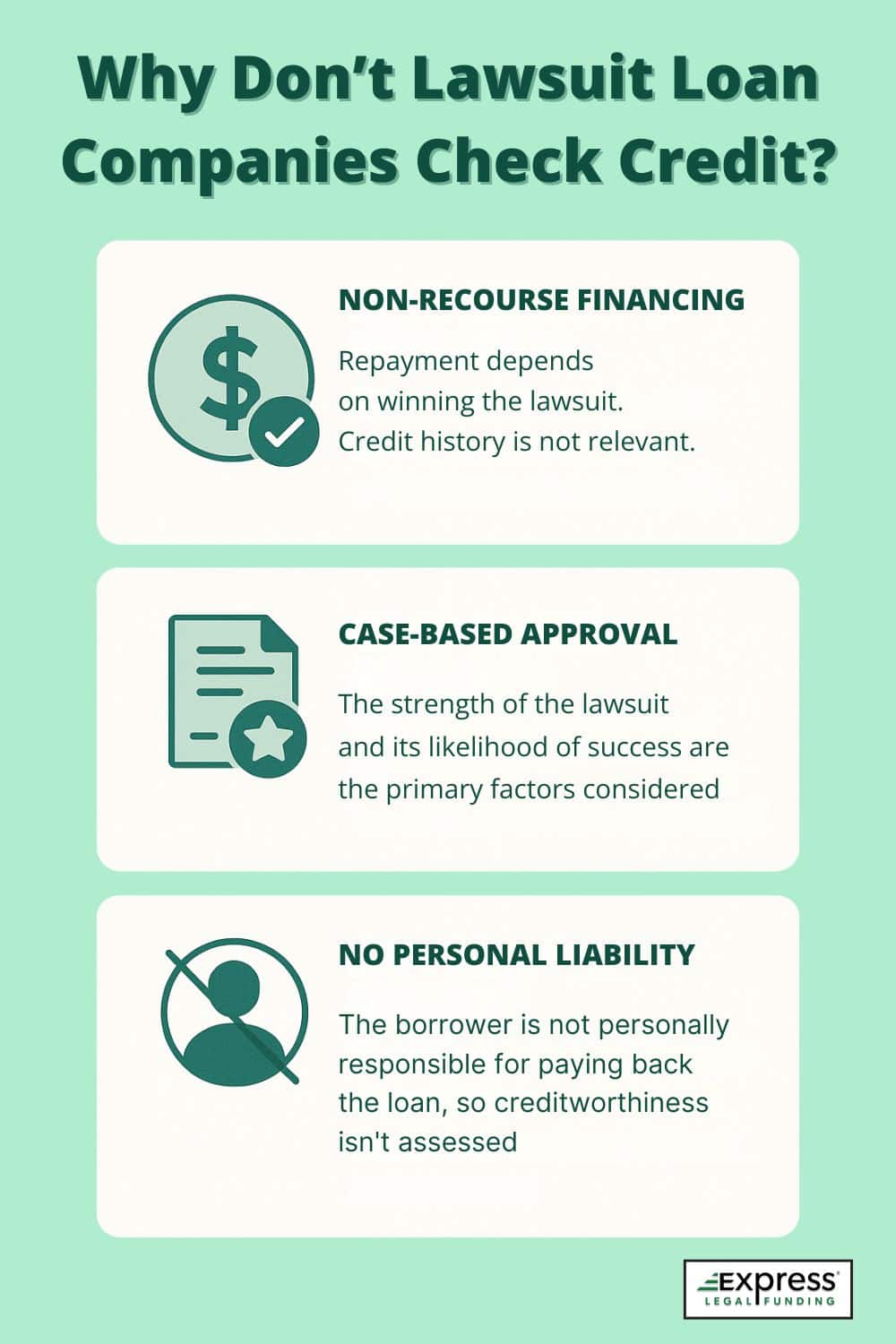
Lawsuit loan companies—also called pre-settlement funding companies—don’t check your credit because approval is based entirely on the strength of your legal case, not your financial history. The advance is non-recourse, meaning you only repay if you win or settle your case.
Since repayment comes directly from your settlement proceeds (handled by your attorney), there’s no need for the company to assess your creditworthiness, income, or employment status.
This makes legal funding accessible to plaintiffs with poor or no credit, without risking negative marks on their credit report.
What Are the Requirements to Qualify for Legal Funding?
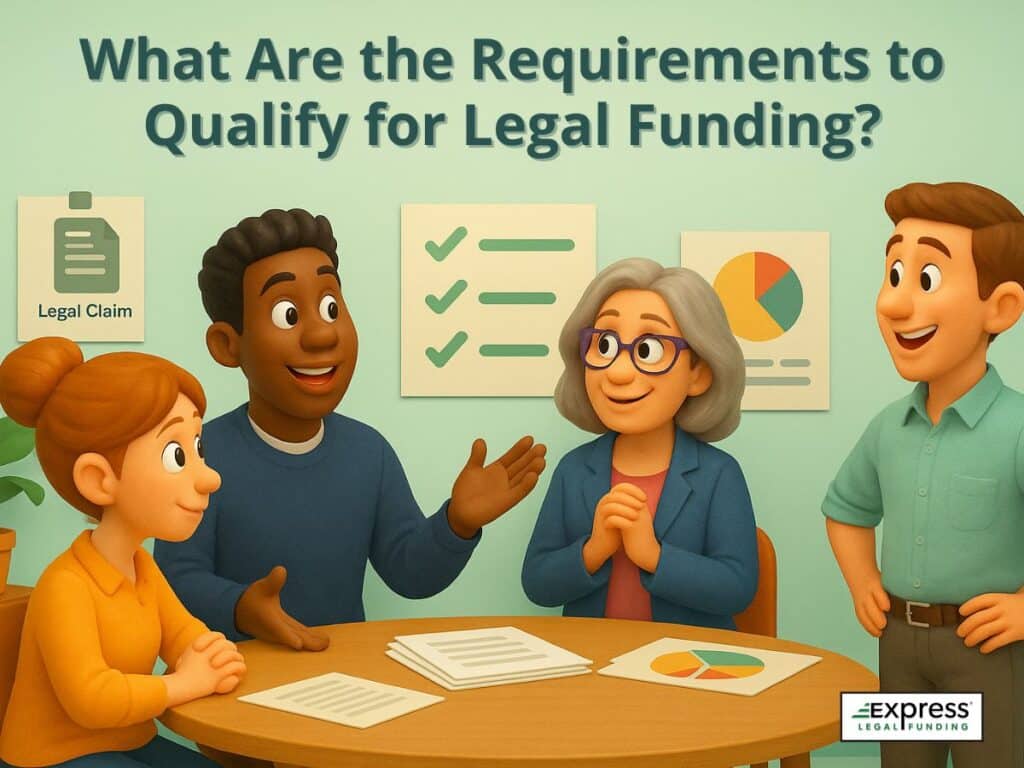
To qualify of pre-settlement funding, Express Legal Funding generally requires that you:
- Have an active claim or lawsuit, often a personal injury case.
- Be represented by a licensed attorney on a contingency fee basis.
- Have a case with sufficient potential settlement value to cover the requested advance.
No credit check, financial documents, pay stubs, or bank statements are required. The settlement serves as collateral.
Learn more about your attorney's role in the legal funding process in this FAQ guide:
Do I Need a Lawyer to Get Legal Funding?
How Pre-Settlement Funding Underwriting Works
Even though pre-settlement funding does not require a credit check, reputable companies still use a structured financial underwriting process to decide whether to approve your application and how much to advance.
Unlike a traditional bank loan or credit card application, this review focuses entirely on the legal and financial strength of your case — not your income, credit score, or personal assets.
Typical Pre-Settlement Funding Underwriting Steps Include:
- Attorney Communication: The funding company contacts your lawyer to confirm representation and request essential case documents. These may include accident reports, medical records, demand letters, or insurance policy information.
- Identity Verification: The funding company confirms the applicant’s identity, often using resources like a TLO search or similar databases. This step ensures you are the rightful claimant, helps prevent fraudulent applications, and may reveal existing liens or judgments related to your case. While it involves reviewing certain public and financial records, it is not related to a credit check and does not affect your credit score.
- Case Review: An underwriter evaluates the key facts — liability (who’s at fault), damages (both economic losses like medical bills and lost wages, and non-economic damages like pain and suffering), and available insurance coverage.
- Settlement Value Estimate: Using the evidence and documentation provided, the company estimates a realistic settlement range, factoring in liens, medical expenses, and attorney fees.
- Advance Amount Calculation: To reduce risk for both sides, most companies advance 10–20% of the net settlement (the amount expected after attorney fees and liens are paid).
- Approval & Contract: If approved, you receive a clear funding agreement outlining the advance amount, fees, and repayment terms.
How Legal Funding Companies Assess Risk and Approve Cases Without Credit Checks
Case Strength Assessment Process
Because pre-settlement funding is non-recourse, repayment only happens if your case is successful, and the funding company is paid directly from your settlement proceeds. This is why approval is based on the strength of your case—not on your credit score, income, or employment history.
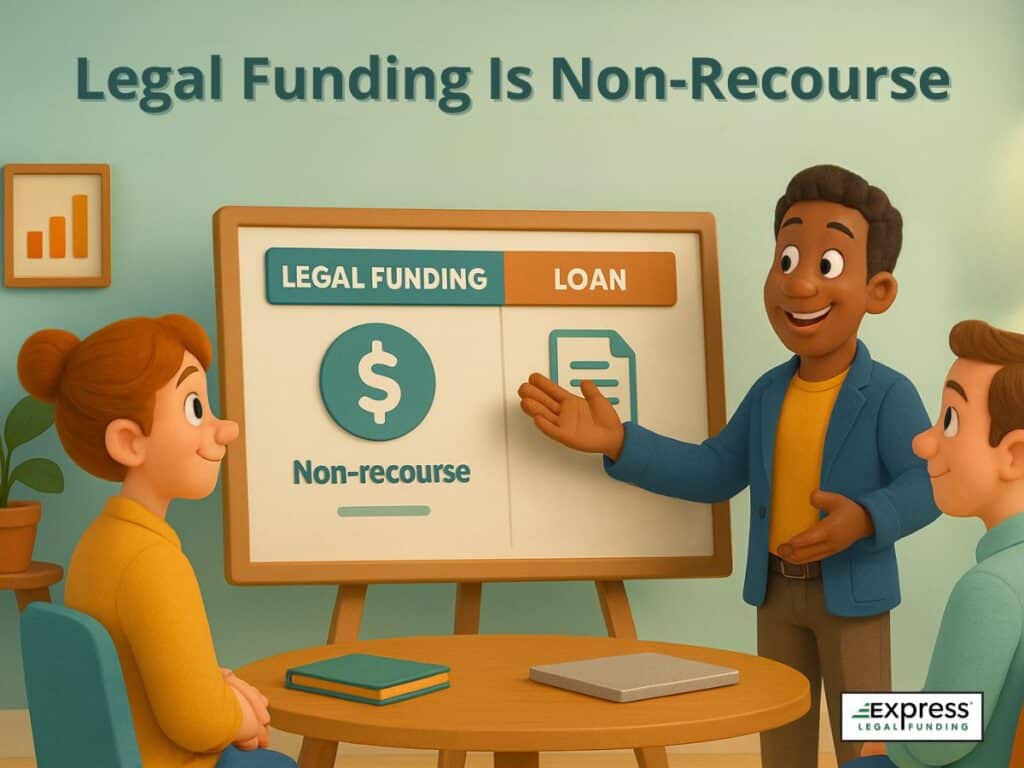
Key elements assessed include:
- Strength of Liability Evidence: Clear proof of fault, backed by police reports, witness statements, or expert testimony.
- Damages Documentation: Verified medical bills, treatment plans, and wage-loss records to support the claimed damages.
- Insurance Policy Limits: Sufficient coverage to realistically pay the anticipated settlement amount
Risk Evaluation Methodology
Once the case strength is established, underwriters determine the funding amount and repayment structure by reviewing:
- Stage of Litigation: Cases closer to trial or with settlement offers carry lower risk.
- Jurisdiction & Jury Trends: Courts known for higher awards may increase potential settlement values.
- Existing Liens or Claims: Medical or other liens, such as overdue child support payments, that could reduce the plaintiff’s net recovery.
Why it matters:
A careful underwriting and risk evaluation process protects plaintiffs from borrowing too much against their settlement — helping ensure they still receive meaningful compensation after repayment. It also allows funding companies to remain financially sustainable, so they can continue helping future plaintiffs.
Regulatory Compliance and Consumer Protections
Pre-settlement legal funding is regulated at the state level in many parts of the U.S., with rules designed to protect consumers and promote transparency. While there is no single federal law governing credit checks for funding, states that address legal funding in their statutes or case law do not require them because approval is based solely on the case’s merits.
For example, under Missouri’s Consumer Legal Funding Act (Mo. Rev. Stat. § 436.564), pre‑settlement funding companies are prohibited from reporting a consumer to a credit reporting agency if the net settlement proceeds are insufficient to cover repayment.
This underscores the industry standard of approving funding based on the merits of the legal claim—not on your personal credit history.
While the Consumer Financial Protection Bureau (CFPB) does not directly regulate all aspects of pre-settlement funding, its mission to prevent unfair or deceptive financial practices influences how reputable companies operate.
At Express Legal Funding, we strive to follow transparency standards consistent with CFPB principles, ensuring contracts are clear, accurate, and free from misleading terms.
Key protections we provide:
- Privacy: We do not access or share your credit report.
- Non-recourse guarantee: You owe nothing if you lose your case.
- Transparent contracts: All terms and fees are disclosed in plain language.
- No hidden fees: Costs are explained upfront.
- Compliance with state laws: We meet or exceed all state-specific requirements.
FAQs About Getting Legal Funding Without a Credit Check
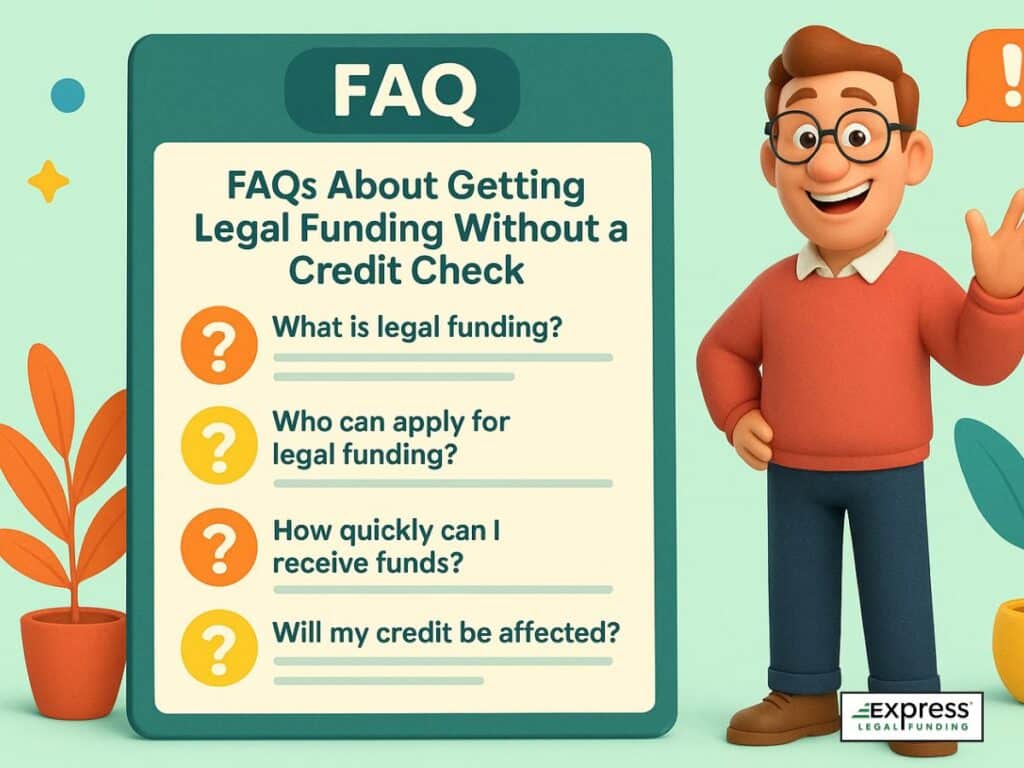
Does pre-settlement funding show up on my credit report?
No. Pre-settlement funding does not appear on your credit report and will not impact your credit history or credit score in any way.
This is because pre-settlement funding is not a traditional loan and is classified as a non-recourse cash advance against your future settlement, not a form of consumer credit.
Since there is no credit check during the approval process and repayment is handled directly through your attorney after your case resolves, there are:
- No hard inquiries that could lower your score.
- No monthly payments reported to credit bureaus.
- No debt collection actions if you lose your case.
In short, receiving pre-settlement funding leaves no trace on your credit profile — making it a safe option for plaintiffs who want to protect their credit while getting the financial support they need.
Can I get legal funding with bad credit?
Yes. Having poor or no credit will not prevent you from qualifying for pre-settlement legal funding.
That’s because approval is based entirely on the strength and potential value of your lawsuit, not your credit history or financial background.
This makes pre-settlement funding a realistic option for plaintiffs with low credit scores who need financial help during a lawsuit but want to avoid the barriers and risks associated with traditional lending.
Do I need to be employed to get pre-settlement funding?
No. Your employment status is not considered when applying for pre-settlement legal funding. Approval is based on the facts of your case, not your employment status or income.
This makes legal funding a viable option for plaintiffs who may be out of work due to their accident or injuries and need financial help while their case proceeds.
What happens if I lose my case?
If you lose your case, you owe nothing back. This is the defining feature of non-recourse legal funding — the repayment obligation exists only if you win or settle your lawsuit.
Because the advance is secured solely by the expected settlement, the funding company assumes all the financial risk. That means:
- If your case is unsuccessful, the balance is completely forgiven.
- You won’t face collections, wage garnishment, or any impact on your credit.
- Your personal finances remain protected regardless of the outcome.
This risk-free structure allows injured plaintiffs to access the money they need during a lawsuit without the fear of being burdened by debt if their case does not resolve in their favor.
Does pre-settlement funding affect getting a mortgage or loan?
No. Pre-settlement funding does not appear on your credit report and does not affect your credit score, so it should not impact your ability to get a mortgage, car loan, or other financing. Since it is a non-recourse cash advance (not a loan) repaid only if you win or settle your case, there are no monthly payments, delinquencies, or debt records reported to credit bureaus.
However, lenders may still consider your overall financial situation, so it’s best to consult your mortgage or loan officer if you have concerns.
How is legal funding different from a loan?
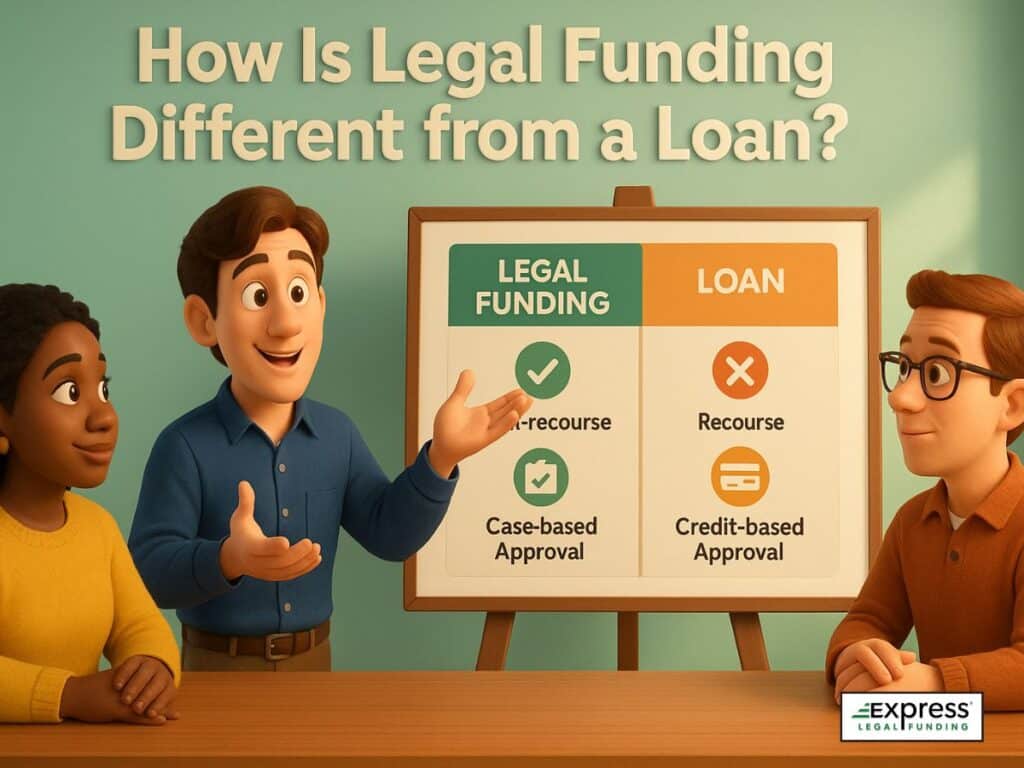
Pre-settlement legal funding is not a traditional loan — it is a non-recourse cash advance secured by your future settlement. This means you only repay if you win or settle your case.
Unlike bank loans or credit-based financing, legal funding has unique advantages:
- No monthly payments: Repayment happens in one lump sum from your settlement, handled by your attorney.
- No personal guarantees: You are not personally liable for repayment if your case is unsuccessful.
- No credit checks: Approval is based solely on your case’s merits, not your credit history or income.
- Risk-free if you lose: If your case does not result in a settlement or award, you owe nothing back.
Because repayment is tied directly to your case’s outcome, legal funding provides plaintiffs with immediate financial relief without adding debt or jeopardizing personal assets.
Relevant FAQ guide: Does Pre-Settlement Funding Require Monthly Payments?
How much money can I get through pre-settlement funding?
The amount you can receive depends on the value and strength of your case. Most pre-settlement funding companies, including Express Legal Funding, typically advance around 10% to 20% of your anticipated settlement amount.
For example:
If your attorney estimates your case may settle for $50,000, you could receive $5,000 to $10,000 as an advance.
Key Factors That Influence the Amount:
- Case value: Higher potential settlements generally qualify for larger advances.
- Liability and damages: Stronger cases with clear liability may receive higher offers.
- Stage of litigation: Cases closer to settlement or trial often qualify for more funding.
Remember, because this is non-recourse funding, you only repay if you win or settle your case — and repayment comes directly from your settlement proceeds.
How long does it take to get the money?
Once your application is approved and your funding contract is signed, most clients receive their money within 24 to 48 hours — and in many cases, the same day.
At Express Legal Funding, we streamline the process because we understand that plaintiffs often need immediate access to cash for living expenses, medical bills, or other urgent costs while waiting for their case to settle.
The speed of funding depends on:
- Contract completion: The sooner you sign and return your funding agreement, the sooner we can release the funds.
- Attorney cooperation: How quickly your attorney provides the required case documentation and signs their acknowledgement of your Irrevocable Letter of Direction (this document instructs your lawyer to repay the funding company directly from your settlement proceeds).
- Approval timing: Applications finalized earlier in the day are more likely to receive same-day funding due to bank cutoff times.
- Payment method: Direct deposit or wire transfers typically arrive faster than mailed checks.
By expediting our review, contract signing, and payment steps, we help clients access the cash they need without unnecessary delays.
What are the fees or interest rates on pre-settlement funding?
Fees and interest rates for pre-settlement funding vary by provider and can depend on your case’s value, how long it takes to resolve, and the company’s pricing structure.
How some legal funding companies charge interest and fees:
- Simple interest: a type of interest that accrues only on the original advance amount, leading to slower growth of the repayment total.
- Compounding interest: a type of interest that is charged on both the original advance and previously accrued interest, which can cause the repayment amount to grow much faster over time.
- Flat fees: This pricing structure involves fixed costs added to the repayment, regardless of the length of the case. Examples include origination and administrative fees added to the contract.
Because costs can add up significantly, it’s essential to:
- Review your contract carefully before signing.
- Ask for a clear total payoff estimate based on your attorney’s expected case timeline.
- Compare multiple providers to ensure you’re getting fair and transparent terms.
Go beyond the basics and uncover a detailed explanation of fees, interest, and repayment terms in our guide: How Much Does Pre-Settlement Legal Funding Cost?
At Express Legal Funding, we believe in clear, upfront pricing so you always know exactly what to expect. Our lawsuit loan calculator can help you estimate the potential cost of borrowing legal funding.
Can I use the money for any purpose?
Yes. Once you receive pre-settlement funding, the money is yours to use however you need — there are no spending restrictions.
Many plaintiffs use the funds to cover essential living expenses and keep up with bills while their lawsuit is pending.
Common uses include:
- Rent or mortgage payments to keep your housing stable.
- Medical bills related to your injuries or ongoing treatment.
- Utilities such as electricity, water, phone, and internet.
- Groceries and other everyday household needs.
- Paying down debt to avoid high interest or late fees.
Because the advance is based on your expected settlement — and repayment only happens if you win or settle — you can use the funds to relieve immediate financial pressure and focus on your recovery and your case.
What types of cases qualify for legal funding?
Most personal injury and similar civil cases can qualify for pre-settlement legal funding, as long as there is a strong likelihood of receiving a settlement or court award. Eligibility is based on the merits of your case and whether your attorney can confirm the necessary case details — not your credit score or personal finances.
Common case types that qualify include:
- Car accidents and other motor vehicle collisions.
- Slip and fall injuries and other premises liability claims.
- Medical malpractice and nursing home negligence.
- Product liability claims involving defective or dangerous products.
- Employment law disputes, such as wrongful termination or discrimination.
- Workplace injuries states where workers’ compensation cases are eligible or those with third-party liability.
Some funding companies, including Express Legal Funding, also consider other case types — such as wrongful death or toxic mold exposure claims — if there is a clear liability and a potential monetary recovery. If you are unsure whether your case qualifies, it’s best to apply or speak with our team for a quick evaluation.
Key Takeaways
- No credit check is required for pre-settlement funding.
- No impact on credit score from applying or receiving funds.
- Approval is based entirely on your case’s potential outcome.
- Fast funding — often within 24 hours of approval.
- 100% risk-free guarantee. If you lose your case, you owe nothing.
About Express Legal Funding
At Express Legal Funding, we help personal injury and accident victims access the money they need while their claims move forward. Our pre-settlement cash advances allow clients to cover essential living expenses, medical bills, and other urgent costs without taking on traditional debt.
With a clear, transparent approval process and repayment only if you win or settle, we make it easier to focus on recovery and your case — not financial stress.
Get Pre-Settlement Funding Without a Credit Check
Don’t let financial strain force you to settle for less. Because approval is based on your case — not your credit history — you can qualify even with poor or no credit. Our streamlined process can put cash in your account in as little as 24 hours after approval.
Apply online or call us today at (888) 232-9223 to find out how much funding you can qualify for. Complete your application below to get started.
